
The Ashen Eagle: On the Edge of the World
- Thread starter Tiberionus
- Start date
-
We have updated our Community Code of Conduct. Please read through the new rules for the forum that are an integral part of Paradox Interactive’s User Agreement.
You are using an out of date browser. It may not display this or other websites correctly.
You should upgrade or use an alternative browser.
You should upgrade or use an alternative browser.
Well, these Romans took a page out of Carthage's book.
Great job reconquering Britannia and Belgica.
Also, will the New World be Roman soon?
Great job reconquering Britannia and Belgica.
Also, will the New World be Roman soon?
- 1
Chapter 8: The 60th Consul
“Leontius the Stern. What a laugh! In Frisia he spent more time with Frankish wine than with his men! He funds an expedition to a new land, and he names it after wine! Don’t vote for the drunkard of the tyrannical Salvii, vote F. Desius Licinius, let us form a true republic!”
“Look at those canvassers for Licinius, they fail to do more than offer shots at the character of M. Leontius Salvius! They have no policy, they have no honor, nay, Desius has barely fought a battle! Vote M. Leontius Salvius, for he will bring peace!” - rival criers for Leontius and Desius Licinius in the election of 1007 AD / 1760 AUC

Upon taking the office of Consul, Leontius Salvius would announce his intention to focus on peace and the rebuilding of Britannica. In an address to the Senate in Londinium, Leontius would state “Gallienus did much to help rebuild the broken land from the Liberation. However, he continued the policy of bringing Liberation to lands beyond that of Britannia. An admirable goal, certainly born of his friendship with the Licinii. But the people need rest. Let us focus on rebuilding, to bring true Roman civilization to the land.” He would then introduce an extensive bill, legislating everything from an increase in funding for public works such as aqueducts and new drainage systems, to the increase of the size of the legions from 1,000 to 5,000 to open up further paths to citizenship for the people of Britannia.
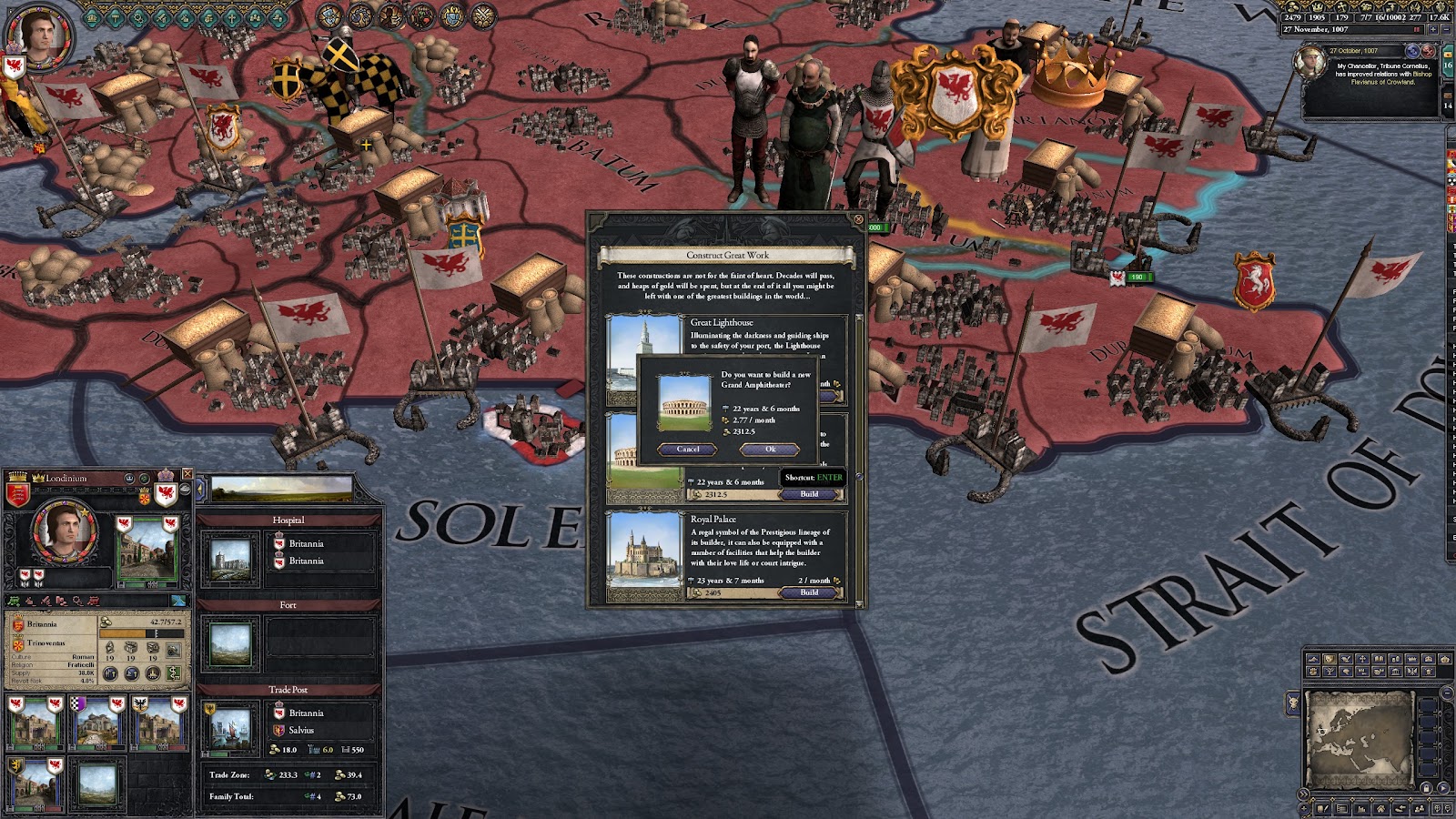
One of the biggest single projects within Leontius’ infrastructure bill was to begin construction on a new Circus for Londinium. In Leontius’ proposed design, it was explicitly modeled after a mixture of the old Circus Maximus and Flavian Amphitheater in Rome, as well the Hippodrome in Constantinople. Placed in the heart of the city, it would function as part theater and part sports arena, and Leontius hoped it would serve as a new center of Roman culture in Britannia.
Beyond this new Circus, Leontius would focus on turning Londinium into a new Campos Vapos, with a rebuilt city wall and new city layout. To pay for all this, not only was a new series of taxes brought in to overhaul the old inefficient Anglican tax model, but wealth seized from old nobles and the overly embellished Papist churches further was used to augment the state revenue
The new taxes and seized church property proved to be controversial, and Leontius found himself having to lead the legions out more than one to suppress some tax protest or revolt by the perugini. The largest such revolt was one led by a son of the King of the Anglo-Saxons named Godric who returned from his family’s exile after his father’s death. Many nobles who had their land taken by Sempronius’ army and given to the peasantry would soon take up arms alongside this new leader who promised to bring about a united Britannia, not under Roman yoke, but ruled by its own. Taking advantage of the anger against the taxes, an army of nearly 8,000 men rose up near Suffolk and began to march on Londinium.
Leontius would march to meet this rebellion, where the legion would find it had almost doubled to nearly 13,000 men. Despite how outnumbered they were, the rebel army was broken in quick order as much of it was unorganized under-armed peasants. The equite was tasked with charging down those who fled, but much of the core of the noble leadership escaped. Before Leontius caught up, hundreds of well equipped nobles similarly roused by the call to resist would join the rebellion. However, as news brought word of how quickly the last group was dispersed, few peasants would join to give numbers to the nobles. Before they could disperse upon realizing their mistake, Leontius’ legion arrived and surrounded the nobles. The Anglican nobles were given a simple choice; surrender and face a fair trial or die in battle.
Facing the possibility of life or certain death, the nobles reluctantly agreed to surrender. Godric and the major ring leaders were beheaded in accordance with the new law, with the remaining number either banished or imprisoned for various lengths of time.
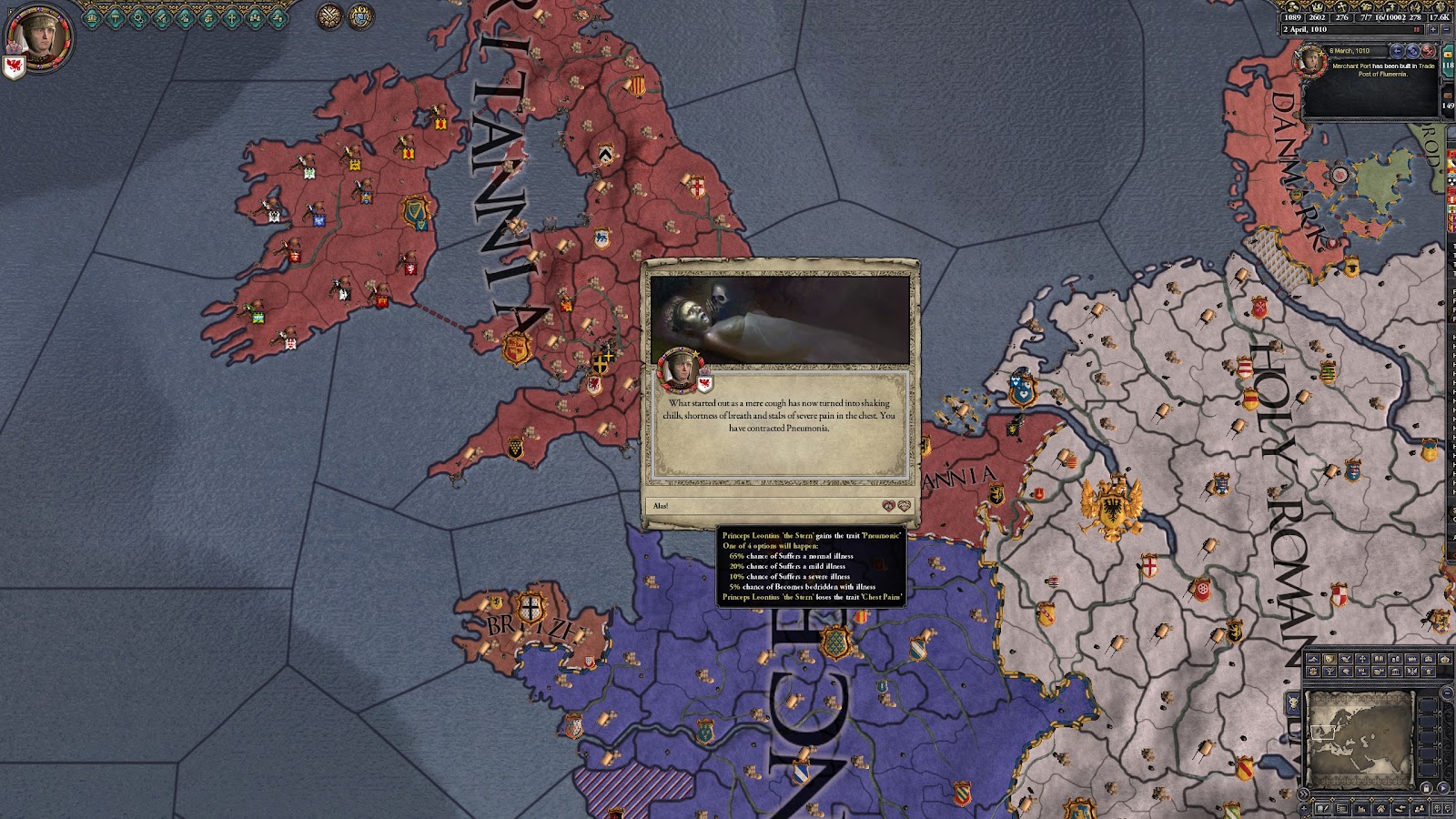
Three years into his Consulship, Leontius would came down with a bad cough that proceeded to get worse and worse. Within days Leontius was bedridden, his body shaking with chills and gasping for what little breath he could. Near completely infirm, Leontius was barely able to attend to the business of state, leaving much of his duties in the hands of the Senate and the praetors. His chest ached from the cough and shooting pains, with strong mint-laced wine barely helping soothe his broken voice. As the days dragged on, many including Leontius himself became convinced that he would soon die such was the severity of his illness.
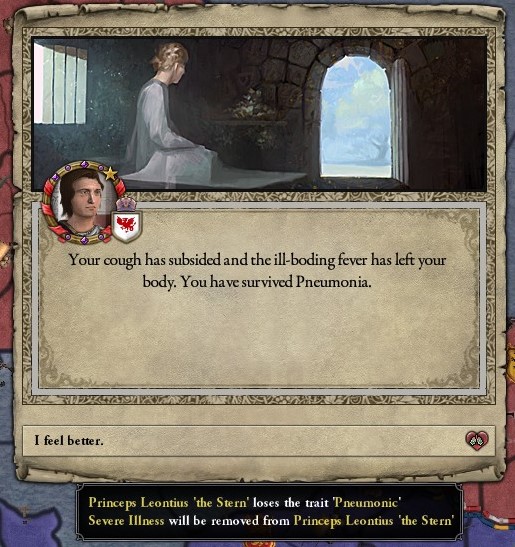
However, as the days turned to weeks, Leontius felt himself slowly grow stronger. First the chills began to subside, then the sharp chest pains, and after a few weeks, he found himself only with a lingering cough. In his return to the Senate for the first time since his illness, Leontius would state the following, “I am still weak so I shall be brief. By the grace of our Lord, I have survived my trial. The imbalance has passed...and I shall be stronger for it. I wish to announce, I, M. Leontius Salvius...shall pay personally..for the start of a great Church..in Cantium, to thank our Lord Jesus Christ and the Father...for seeing me through such...a trial.”
The sight of the weak, but still standing Consul sent cheers through the Senate, and propraetor soon put forward a motion that the state should help fund Leontius’ project to the glory of God. Soon, ground would be broken on the construction of a new Basilica in Cantium, the new seat of the Insulan rites.

As the revolts against the new Roman rule over Britannia slowed and most of the peasants had learned that the King was dead, long live the Consul, a lingering threat remained. The instability brought by the bloody invasion of Britannia, then the years of war and revolt had left many parts of the countryside infested with petty bandits. On the recommendation from his master of the Horse Sempronius Salvius, Leontius ordered the construction of outposts along the rebuilt road network. From these outposts, mounted troops could quickly track down reports of bandits and chase them down. Working outward from a new mile marker 0 in Londinium, these outposts would create an ever expanding zone of stability that soon stretched across Britannia as a new Roman road network was constructed.
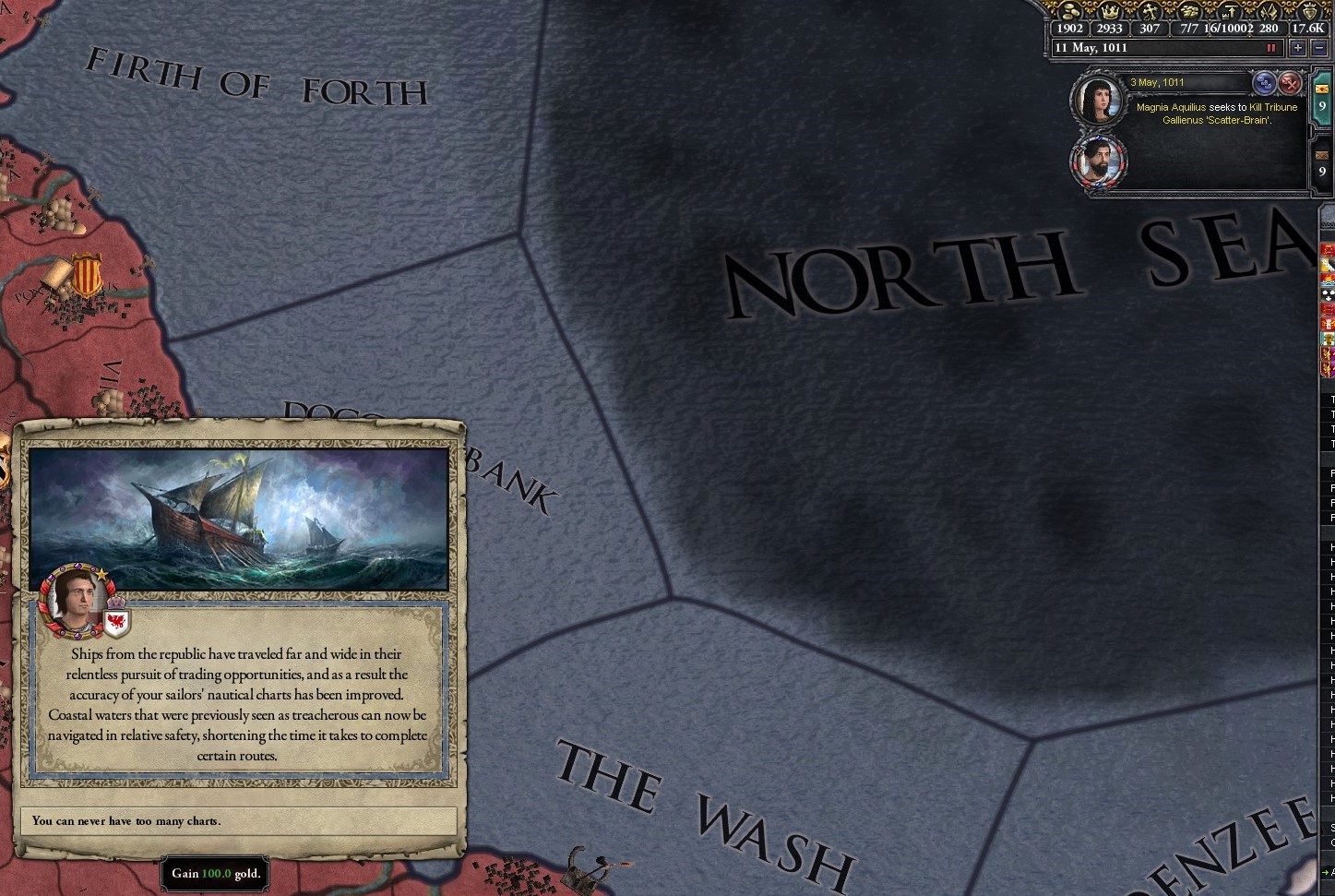

In May of 1764 AUC (1011 AD), the great explorer Lucius Seneca returned after his second great voyage to the west. His ship was full of exoctic lumber and furs he had traded with the barbarian locals he had found in increasing numbers during his voyage. More importantly, he had created extensive charts of the lands of Vinum, finding a far more extensive land than expected. Despite the scale of the land and abundance of forest and fur, Seneca reported “The lands I found were universally poor, finding nary a stone structure. A land of true barbarians whom we had no trouble in convincing granting us furs for trinkets. These furs were of excellent quality, and thus it is my opinion a colony established in one of the excellent harbors we discovered would be quickly profitable.”.
The charts and reports of Seneca were enticing to Leontius, as they offered a way for further expansion without pushing their luck further with Europe. However, he was not yet convinced that fur and lumber alone could sustain Rome in this western land, as such he ordered Seneca to prepare a 3rd expedition to go even further. This would be the greatest yet such exploration meant over several years to explore this new land, learn of the barbarians living there, and the best possible home for a Roman colony.
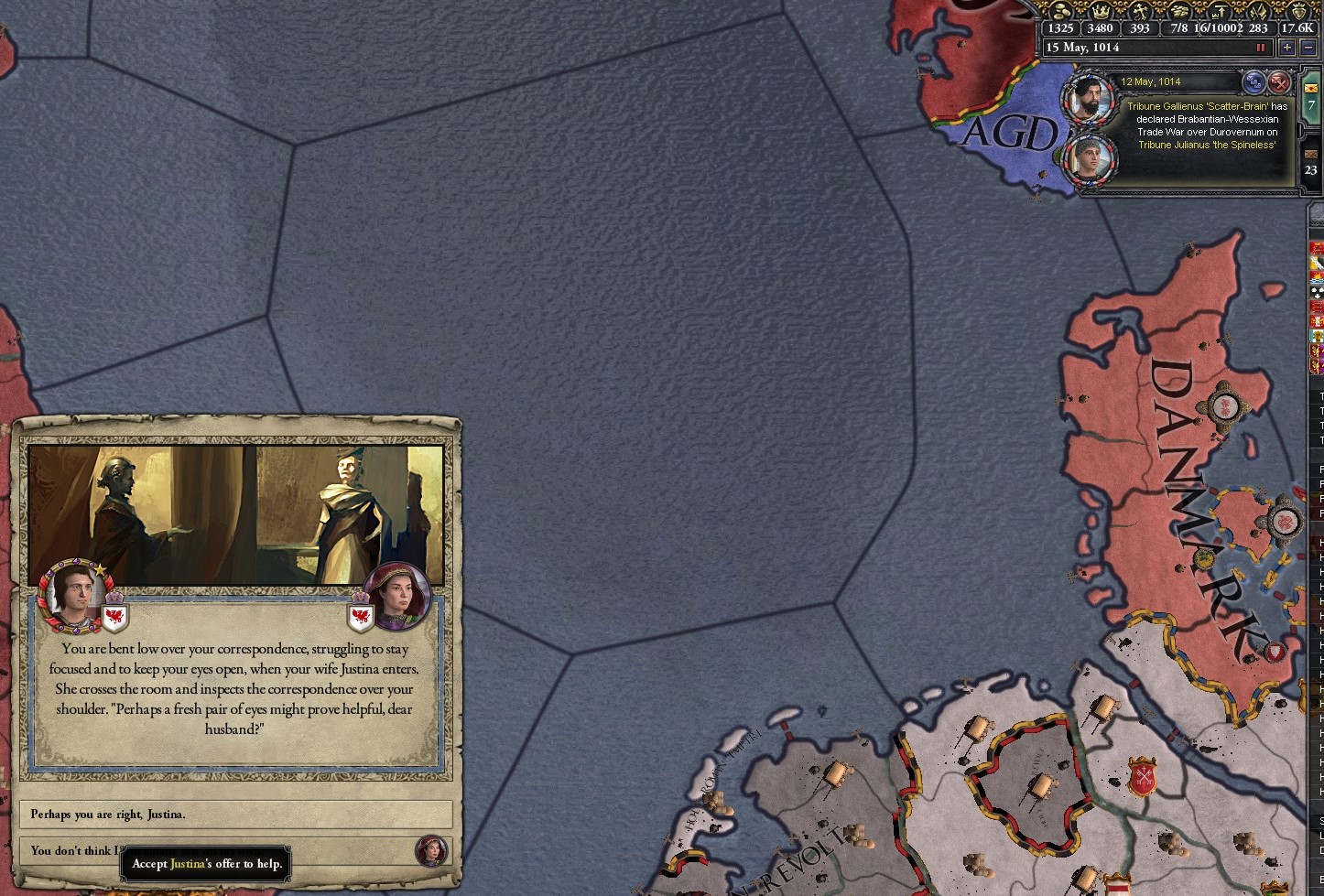

As the years of Leontius’ Consulship dragged on, the stress of the job began to wear on him. He found it increasingly difficult to work as long or as well as he once could. His loyal wife, Justina, became concerned for his well-being as she noted her husband growing increasingly weary of the reigns of the executive. Late one night as Leontius looked over foriegn correspondence over trade with the Eastern Empire, Justina decided to intervene. Having been raised on the finer points of speech, Justina was quickly able to talk Leontius in allowing her to help with a simple offer of giving his eyes a rest while he got a new perspective.
Very quickly, Justina was able to enrapture Leontius into an extremely productive debate on the merits of one potential senatorial ambassador or the other, or how terms of trade would benefit one nation or the other. Leontius quickly came around to realize just how much of a brilliant diplomat his wife was, and her suggestions combined with his knowledge produced an incredibly promising result that would benefit not only Brittania, but the Eastern Empire, and the Salvii family. Before they wrapped up their discussion, Leontius paused and asked Justina a simple question, “My love, you have utterly surprised me with your intellect tonight. Might I ask, what is something you have always wished seen done with our great Commonwealth?”
Justina’s response was quick, and near without pause, “I wish to serve Rome as a Roman should. In the Forum, on the Cursus Honorum, in the Legions”. The utter conviction and rapidity of her answer shocked Leontius, leaving him stunned in his seat. “Justina…” he started
“Leontius.” Justina cut him off, satirizing his tone, “2,000 years of “tradition” on the “virtue of the woman” should not matter. Have I not shown myself capable? Isn’t one of the greatest virtues of Rome that of liberty? Of the merit of her people? If I am worthy, shouldn’t I not stand before a Roman, as a Roman?”
Leontius swallowed, fighting back the urge to shut down his wife and losing her input, “I may see that. But such a thing...It stands no chance in the Senate. You ask the greatest paterfamilias of our nation to surrender the tradition that saw us through our exile. I cannot do such a thing.”
Justina looked at her husband with a fierce look in her eye, “Try.”. And with that, such a rare moment of breaking with her role as a Roman wife came to an end as she turned and left leaving Leontius stunned and uncertain how to proceed.

Finally, Leontius came to the conclusion he would try to at least get the first step on the way to what his wife wished for on the way. The following day, he went before the Senate and began a long speech on the virtue of Rome, and her citizens. He pulled out every stop he could think to butter up the Senate to the matter he was going to present, drawing on many of the same, although softer, lines his wife had tugged on. Finally, he ended with proposing a bill he hoped would be limited enough to appease his wife, without angering the Senate. He said, “As Romans, we all faced the trials of the exile, or that of the Liberation. Every one of us, on the field or in the hearth, suffered something from the decades before. Every Roman should themselves as virtuous, and overflowing with honor and a spirit of sacrifice equal to none. I propose a recognition of such. As the women tended the fields, ran our estates, and kept the hearth alive whilst the men brought the Liberation to Britannia, I propose that those women of sufficient virtue and spirit of sacrifice be allow to be appointed to such magistries that do not require a Curial or military honorific.”
A stunned silence filled the Senate chamber. Not a single one of the white toga clad Senators had expected such a bill to even be considered by a man, much less one of a Consular rank. The silence seemed to last for eternity, before the chamber erupted into laughter. Mockery fell down from the benches, accusations that Leontius sought to destroy good Roman order, and more such petty insults. The chamber refused to come to order after repeated attempts, and not a single Senator spoke out in favor. Growing ever more frustrated, Leontius ordered Senatorial business suspended for the day, his bill dying immediately on proposal.
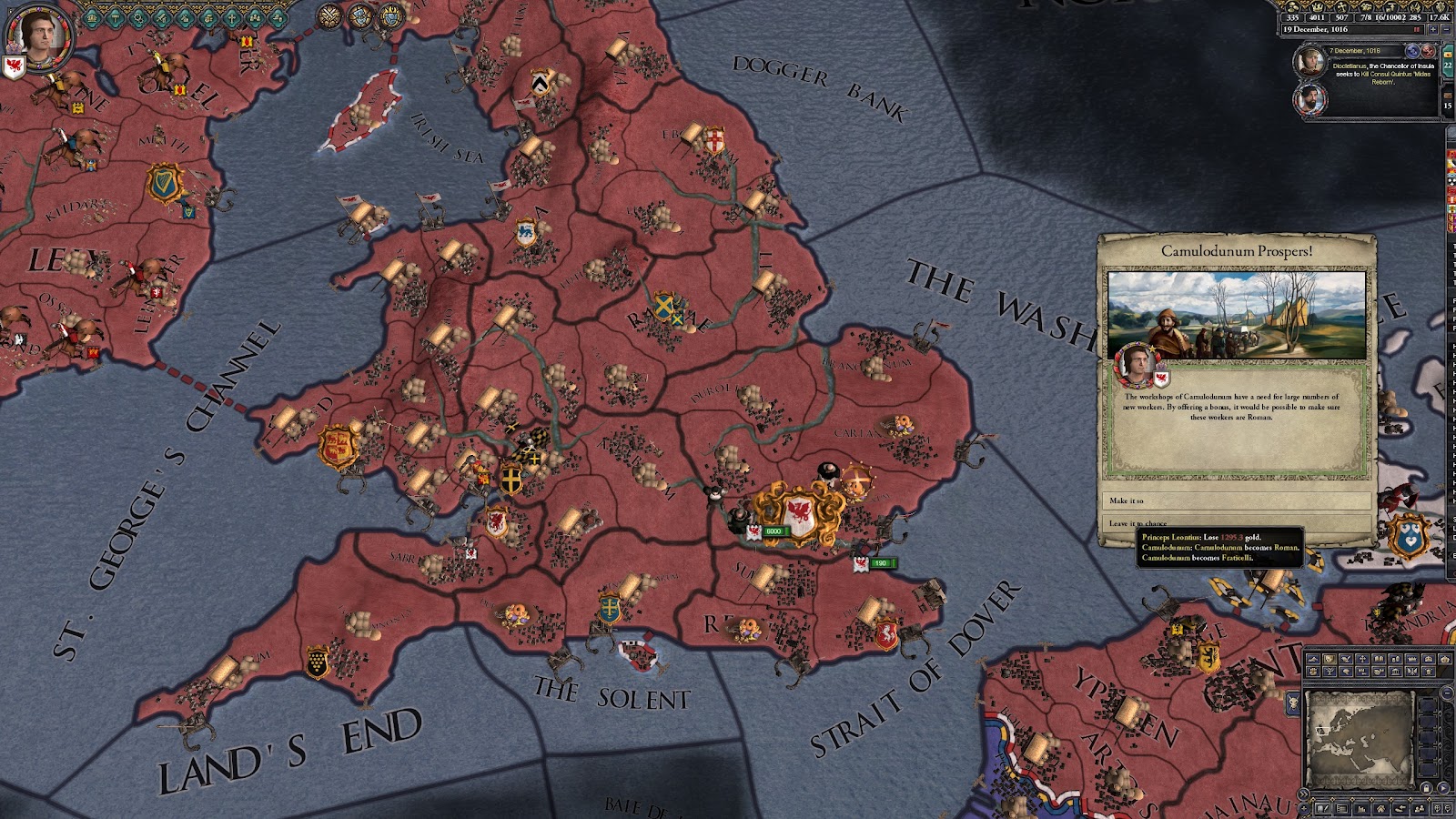
Some time later, as the influence of Roman culture seeped deeper into the peasantry of Britannia, and colonies grew ever larger, Leontius saw an opportunity in Camulodunum. As Romans from Insula came to the region, many brought their extensive expertise in watermill manufacturing. This led to a growing number of workshops especially massive grain mills popping up along the rivers and new road network. Leontius decided to offer an incentive for those workers at the workshops to attend lectures and a Roman style education in their off time to improve their literacy and teach them the Latin language. Then the mill owners were told to only allow Latin within the workplace to enforce the lessons further. Soon enough, as Latin became near required to even hint at the social mobility promised by the new roman regime, Latin became a near universal second, or even first, language. Especially in regions like Camulodunum where this program was most intense.


As the election season for 1017 drew nearer, Leontius decided that a further term in government would simply not be for him. So he took the unusual step for one of the Salvii family of declining to run for a second 10 year term. Instead he endorsed his cousin, Lucius Sergius Salvius. As part of his campaign for Sergius, Leontius noted a hospital run by the Church had become overflowing with poor peasants who had thought moving to the city would bring them new wealth. It was quickly running out of room to house these immigrants, so Leontius would pay out of pocket to expand the housing of the hospital and to feed the starving masses. At a great feast for the hospital, he simply declared to them, especially those rare Roman citizens amongst them, “This is a gift of the Salvii family to the good People of Rome!”.
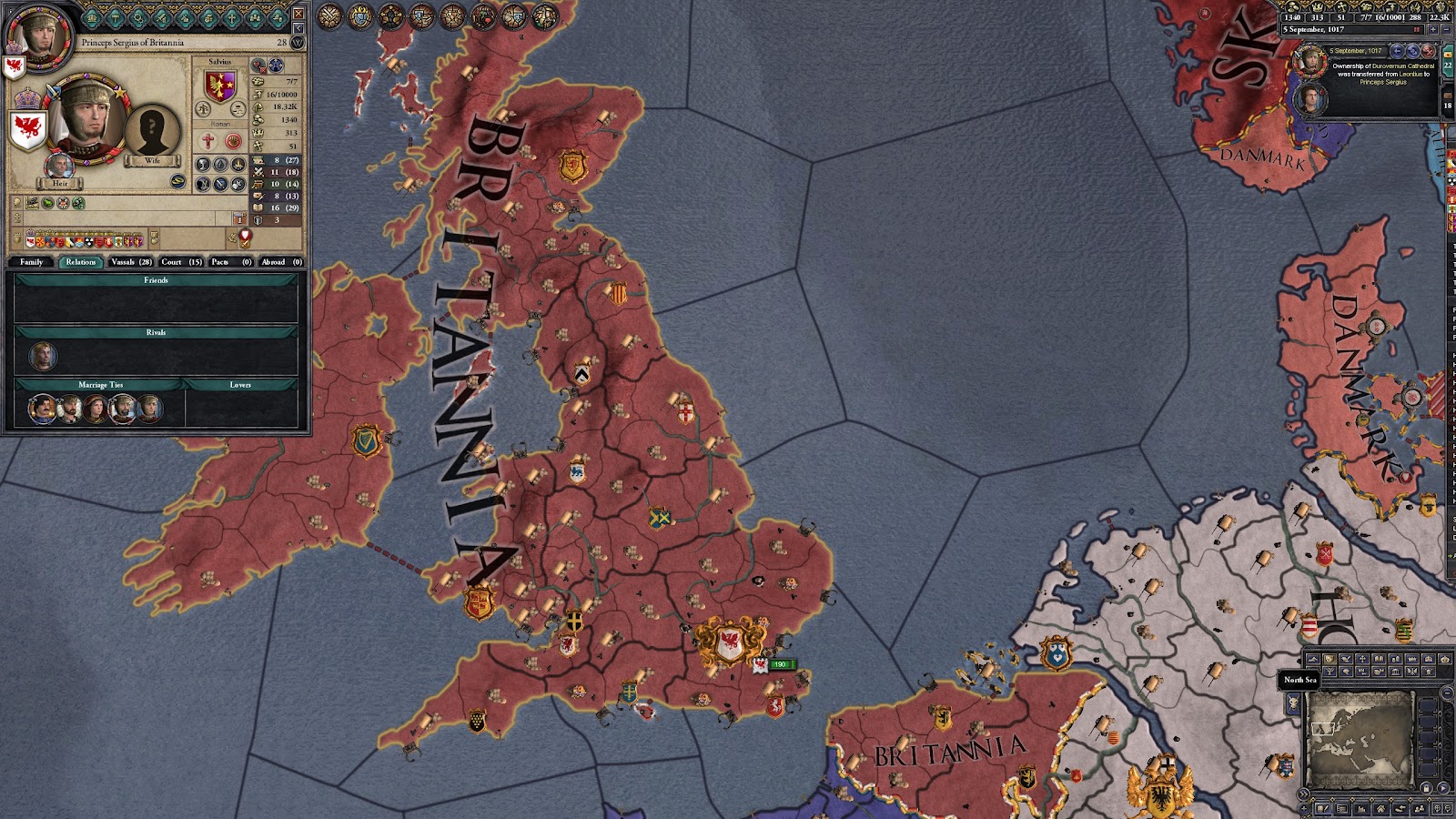
With this being one of the final acts of the campaign, the good will it won amongst the people led to an utter landslide for Sergius. A young, cunning man who had won much fame leading anti-Norse raider campaigns, the citizenry loved him and all the Salvii family had done under Leontius. Thus, before the People of Londinium, Sergius Salvius would become the 61st ruler of Insula and the 3rd elected Consul of the Western Empire in Britannia in 1770 AUC (1017 AD).
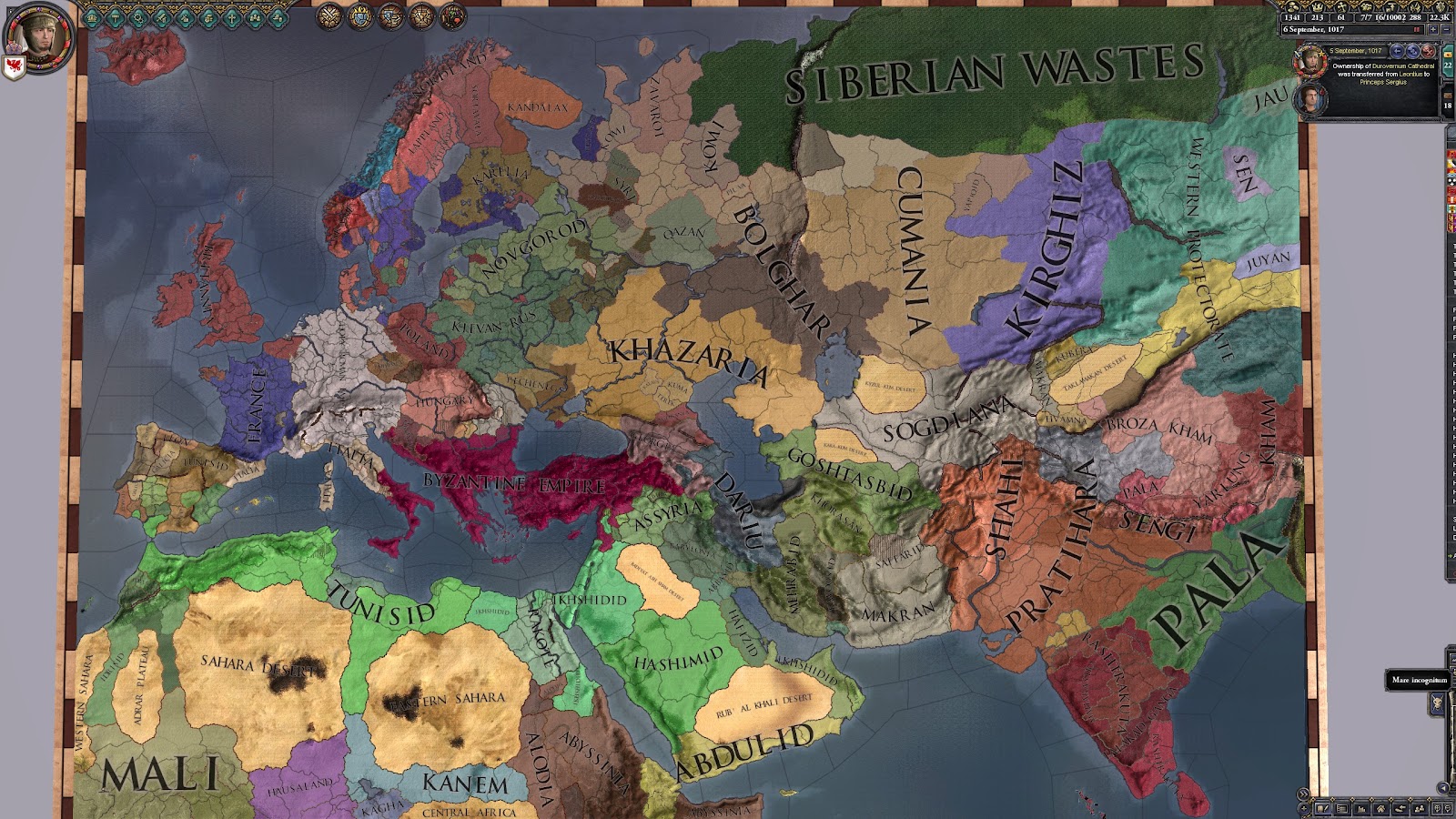
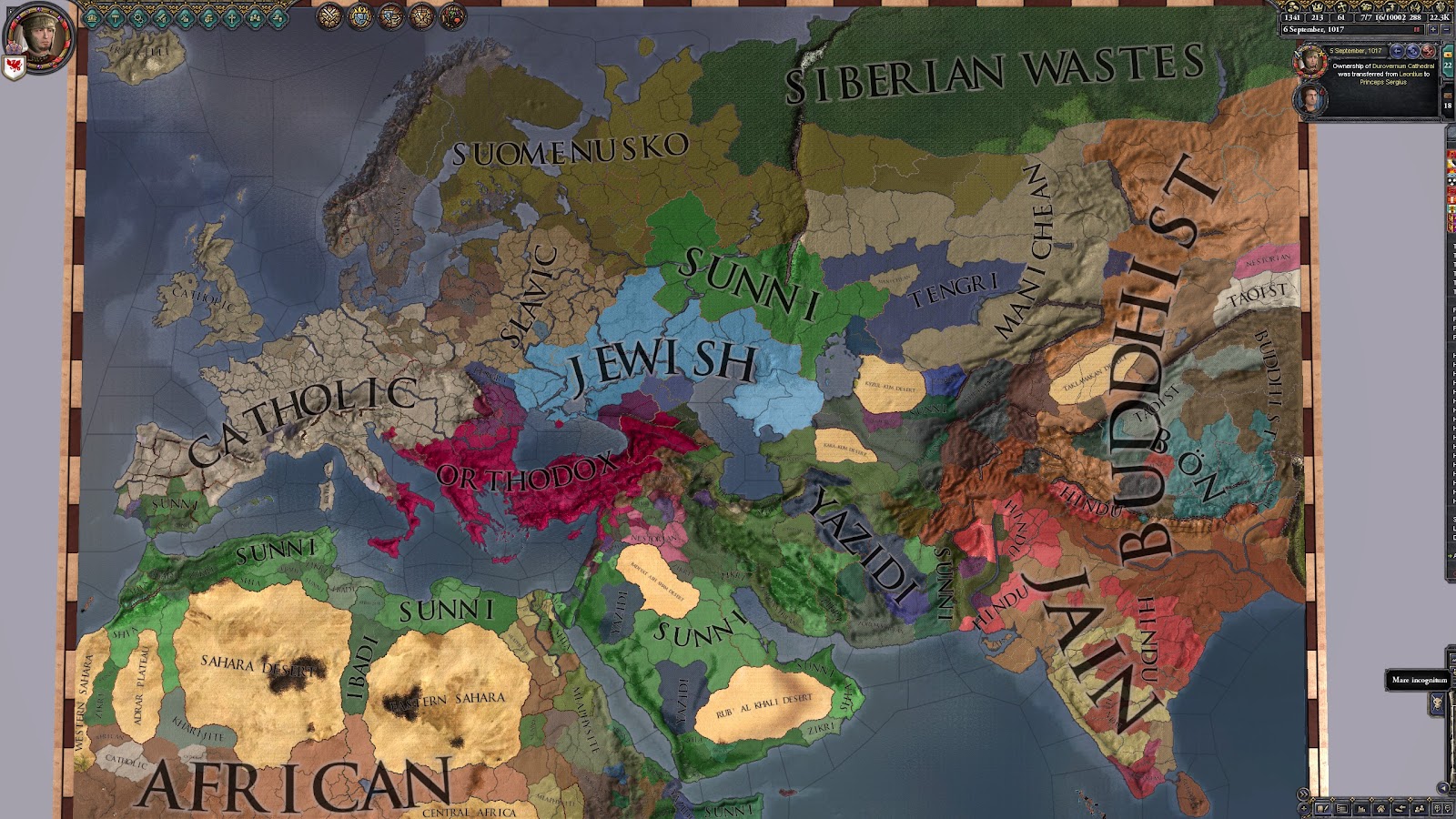
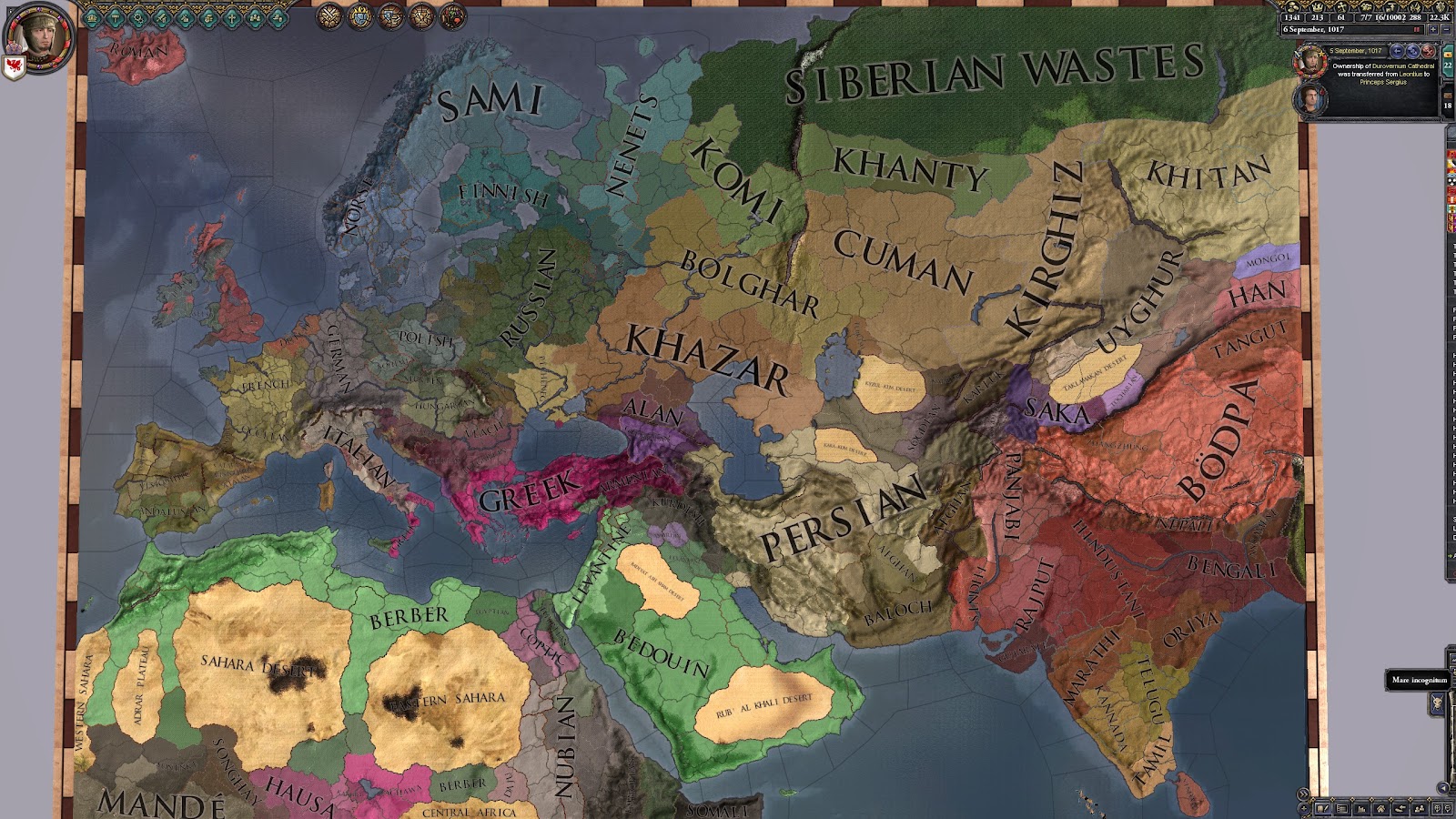
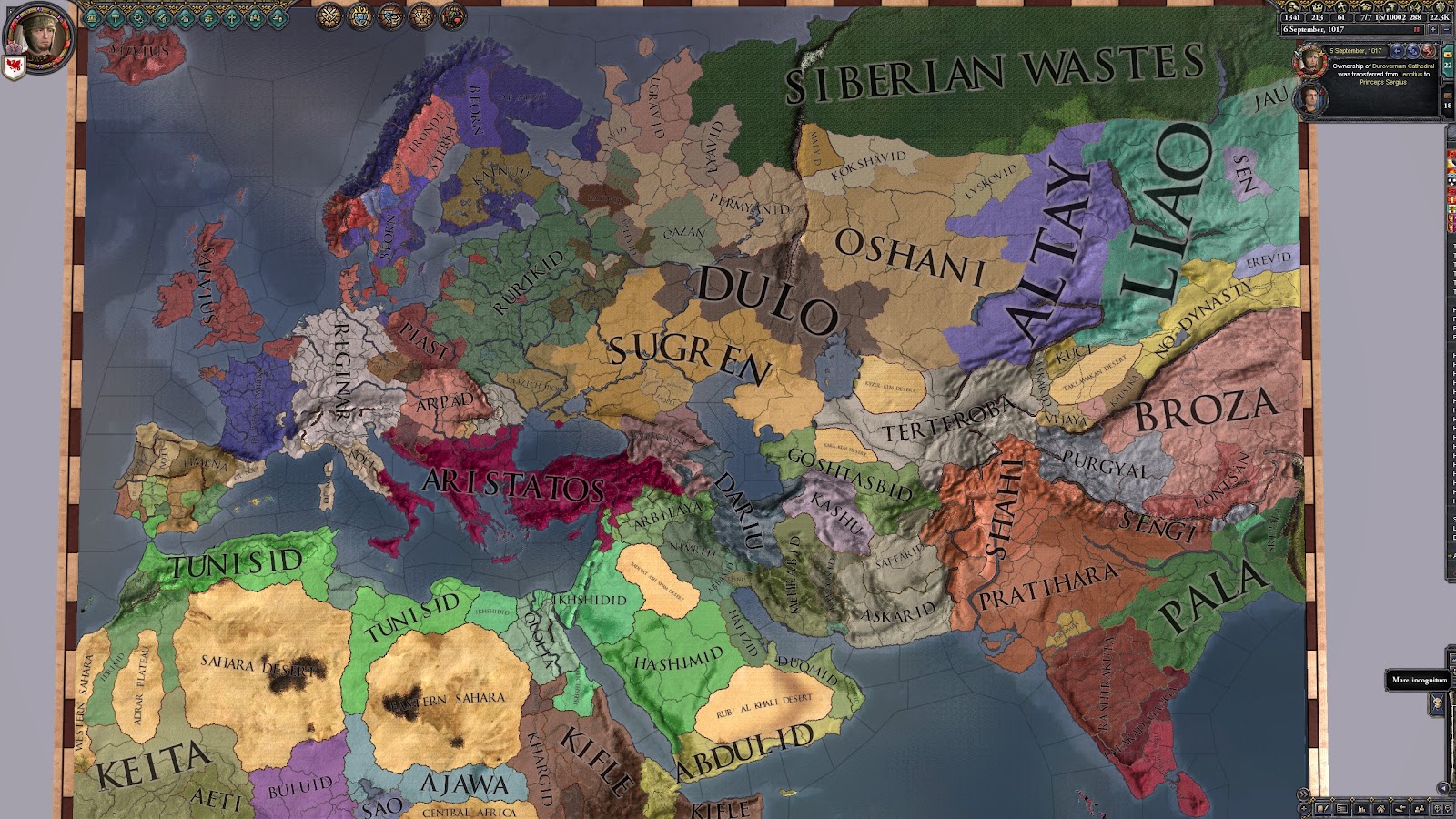
The World Situation after the Election of Sergius Salvius, 1017 AD / 1770 AUC
“Leontius the Stern. What a laugh! In Frisia he spent more time with Frankish wine than with his men! He funds an expedition to a new land, and he names it after wine! Don’t vote for the drunkard of the tyrannical Salvii, vote F. Desius Licinius, let us form a true republic!”
“Look at those canvassers for Licinius, they fail to do more than offer shots at the character of M. Leontius Salvius! They have no policy, they have no honor, nay, Desius has barely fought a battle! Vote M. Leontius Salvius, for he will bring peace!” - rival criers for Leontius and Desius Licinius in the election of 1007 AD / 1760 AUC
Upon taking the office of Consul, Leontius Salvius would announce his intention to focus on peace and the rebuilding of Britannica. In an address to the Senate in Londinium, Leontius would state “Gallienus did much to help rebuild the broken land from the Liberation. However, he continued the policy of bringing Liberation to lands beyond that of Britannia. An admirable goal, certainly born of his friendship with the Licinii. But the people need rest. Let us focus on rebuilding, to bring true Roman civilization to the land.” He would then introduce an extensive bill, legislating everything from an increase in funding for public works such as aqueducts and new drainage systems, to the increase of the size of the legions from 1,000 to 5,000 to open up further paths to citizenship for the people of Britannia.
One of the biggest single projects within Leontius’ infrastructure bill was to begin construction on a new Circus for Londinium. In Leontius’ proposed design, it was explicitly modeled after a mixture of the old Circus Maximus and Flavian Amphitheater in Rome, as well the Hippodrome in Constantinople. Placed in the heart of the city, it would function as part theater and part sports arena, and Leontius hoped it would serve as a new center of Roman culture in Britannia.
Beyond this new Circus, Leontius would focus on turning Londinium into a new Campos Vapos, with a rebuilt city wall and new city layout. To pay for all this, not only was a new series of taxes brought in to overhaul the old inefficient Anglican tax model, but wealth seized from old nobles and the overly embellished Papist churches further was used to augment the state revenue
The new taxes and seized church property proved to be controversial, and Leontius found himself having to lead the legions out more than one to suppress some tax protest or revolt by the perugini. The largest such revolt was one led by a son of the King of the Anglo-Saxons named Godric who returned from his family’s exile after his father’s death. Many nobles who had their land taken by Sempronius’ army and given to the peasantry would soon take up arms alongside this new leader who promised to bring about a united Britannia, not under Roman yoke, but ruled by its own. Taking advantage of the anger against the taxes, an army of nearly 8,000 men rose up near Suffolk and began to march on Londinium.
Leontius would march to meet this rebellion, where the legion would find it had almost doubled to nearly 13,000 men. Despite how outnumbered they were, the rebel army was broken in quick order as much of it was unorganized under-armed peasants. The equite was tasked with charging down those who fled, but much of the core of the noble leadership escaped. Before Leontius caught up, hundreds of well equipped nobles similarly roused by the call to resist would join the rebellion. However, as news brought word of how quickly the last group was dispersed, few peasants would join to give numbers to the nobles. Before they could disperse upon realizing their mistake, Leontius’ legion arrived and surrounded the nobles. The Anglican nobles were given a simple choice; surrender and face a fair trial or die in battle.
Facing the possibility of life or certain death, the nobles reluctantly agreed to surrender. Godric and the major ring leaders were beheaded in accordance with the new law, with the remaining number either banished or imprisoned for various lengths of time.
Three years into his Consulship, Leontius would came down with a bad cough that proceeded to get worse and worse. Within days Leontius was bedridden, his body shaking with chills and gasping for what little breath he could. Near completely infirm, Leontius was barely able to attend to the business of state, leaving much of his duties in the hands of the Senate and the praetors. His chest ached from the cough and shooting pains, with strong mint-laced wine barely helping soothe his broken voice. As the days dragged on, many including Leontius himself became convinced that he would soon die such was the severity of his illness.
However, as the days turned to weeks, Leontius felt himself slowly grow stronger. First the chills began to subside, then the sharp chest pains, and after a few weeks, he found himself only with a lingering cough. In his return to the Senate for the first time since his illness, Leontius would state the following, “I am still weak so I shall be brief. By the grace of our Lord, I have survived my trial. The imbalance has passed...and I shall be stronger for it. I wish to announce, I, M. Leontius Salvius...shall pay personally..for the start of a great Church..in Cantium, to thank our Lord Jesus Christ and the Father...for seeing me through such...a trial.”
The sight of the weak, but still standing Consul sent cheers through the Senate, and propraetor soon put forward a motion that the state should help fund Leontius’ project to the glory of God. Soon, ground would be broken on the construction of a new Basilica in Cantium, the new seat of the Insulan rites.
As the revolts against the new Roman rule over Britannia slowed and most of the peasants had learned that the King was dead, long live the Consul, a lingering threat remained. The instability brought by the bloody invasion of Britannia, then the years of war and revolt had left many parts of the countryside infested with petty bandits. On the recommendation from his master of the Horse Sempronius Salvius, Leontius ordered the construction of outposts along the rebuilt road network. From these outposts, mounted troops could quickly track down reports of bandits and chase them down. Working outward from a new mile marker 0 in Londinium, these outposts would create an ever expanding zone of stability that soon stretched across Britannia as a new Roman road network was constructed.
In May of 1764 AUC (1011 AD), the great explorer Lucius Seneca returned after his second great voyage to the west. His ship was full of exoctic lumber and furs he had traded with the barbarian locals he had found in increasing numbers during his voyage. More importantly, he had created extensive charts of the lands of Vinum, finding a far more extensive land than expected. Despite the scale of the land and abundance of forest and fur, Seneca reported “The lands I found were universally poor, finding nary a stone structure. A land of true barbarians whom we had no trouble in convincing granting us furs for trinkets. These furs were of excellent quality, and thus it is my opinion a colony established in one of the excellent harbors we discovered would be quickly profitable.”.
The charts and reports of Seneca were enticing to Leontius, as they offered a way for further expansion without pushing their luck further with Europe. However, he was not yet convinced that fur and lumber alone could sustain Rome in this western land, as such he ordered Seneca to prepare a 3rd expedition to go even further. This would be the greatest yet such exploration meant over several years to explore this new land, learn of the barbarians living there, and the best possible home for a Roman colony.
As the years of Leontius’ Consulship dragged on, the stress of the job began to wear on him. He found it increasingly difficult to work as long or as well as he once could. His loyal wife, Justina, became concerned for his well-being as she noted her husband growing increasingly weary of the reigns of the executive. Late one night as Leontius looked over foriegn correspondence over trade with the Eastern Empire, Justina decided to intervene. Having been raised on the finer points of speech, Justina was quickly able to talk Leontius in allowing her to help with a simple offer of giving his eyes a rest while he got a new perspective.
Very quickly, Justina was able to enrapture Leontius into an extremely productive debate on the merits of one potential senatorial ambassador or the other, or how terms of trade would benefit one nation or the other. Leontius quickly came around to realize just how much of a brilliant diplomat his wife was, and her suggestions combined with his knowledge produced an incredibly promising result that would benefit not only Brittania, but the Eastern Empire, and the Salvii family. Before they wrapped up their discussion, Leontius paused and asked Justina a simple question, “My love, you have utterly surprised me with your intellect tonight. Might I ask, what is something you have always wished seen done with our great Commonwealth?”
Justina’s response was quick, and near without pause, “I wish to serve Rome as a Roman should. In the Forum, on the Cursus Honorum, in the Legions”. The utter conviction and rapidity of her answer shocked Leontius, leaving him stunned in his seat. “Justina…” he started
“Leontius.” Justina cut him off, satirizing his tone, “2,000 years of “tradition” on the “virtue of the woman” should not matter. Have I not shown myself capable? Isn’t one of the greatest virtues of Rome that of liberty? Of the merit of her people? If I am worthy, shouldn’t I not stand before a Roman, as a Roman?”
Leontius swallowed, fighting back the urge to shut down his wife and losing her input, “I may see that. But such a thing...It stands no chance in the Senate. You ask the greatest paterfamilias of our nation to surrender the tradition that saw us through our exile. I cannot do such a thing.”
Justina looked at her husband with a fierce look in her eye, “Try.”. And with that, such a rare moment of breaking with her role as a Roman wife came to an end as she turned and left leaving Leontius stunned and uncertain how to proceed.
Finally, Leontius came to the conclusion he would try to at least get the first step on the way to what his wife wished for on the way. The following day, he went before the Senate and began a long speech on the virtue of Rome, and her citizens. He pulled out every stop he could think to butter up the Senate to the matter he was going to present, drawing on many of the same, although softer, lines his wife had tugged on. Finally, he ended with proposing a bill he hoped would be limited enough to appease his wife, without angering the Senate. He said, “As Romans, we all faced the trials of the exile, or that of the Liberation. Every one of us, on the field or in the hearth, suffered something from the decades before. Every Roman should themselves as virtuous, and overflowing with honor and a spirit of sacrifice equal to none. I propose a recognition of such. As the women tended the fields, ran our estates, and kept the hearth alive whilst the men brought the Liberation to Britannia, I propose that those women of sufficient virtue and spirit of sacrifice be allow to be appointed to such magistries that do not require a Curial or military honorific.”
A stunned silence filled the Senate chamber. Not a single one of the white toga clad Senators had expected such a bill to even be considered by a man, much less one of a Consular rank. The silence seemed to last for eternity, before the chamber erupted into laughter. Mockery fell down from the benches, accusations that Leontius sought to destroy good Roman order, and more such petty insults. The chamber refused to come to order after repeated attempts, and not a single Senator spoke out in favor. Growing ever more frustrated, Leontius ordered Senatorial business suspended for the day, his bill dying immediately on proposal.
Some time later, as the influence of Roman culture seeped deeper into the peasantry of Britannia, and colonies grew ever larger, Leontius saw an opportunity in Camulodunum. As Romans from Insula came to the region, many brought their extensive expertise in watermill manufacturing. This led to a growing number of workshops especially massive grain mills popping up along the rivers and new road network. Leontius decided to offer an incentive for those workers at the workshops to attend lectures and a Roman style education in their off time to improve their literacy and teach them the Latin language. Then the mill owners were told to only allow Latin within the workplace to enforce the lessons further. Soon enough, as Latin became near required to even hint at the social mobility promised by the new roman regime, Latin became a near universal second, or even first, language. Especially in regions like Camulodunum where this program was most intense.
As the election season for 1017 drew nearer, Leontius decided that a further term in government would simply not be for him. So he took the unusual step for one of the Salvii family of declining to run for a second 10 year term. Instead he endorsed his cousin, Lucius Sergius Salvius. As part of his campaign for Sergius, Leontius noted a hospital run by the Church had become overflowing with poor peasants who had thought moving to the city would bring them new wealth. It was quickly running out of room to house these immigrants, so Leontius would pay out of pocket to expand the housing of the hospital and to feed the starving masses. At a great feast for the hospital, he simply declared to them, especially those rare Roman citizens amongst them, “This is a gift of the Salvii family to the good People of Rome!”.
With this being one of the final acts of the campaign, the good will it won amongst the people led to an utter landslide for Sergius. A young, cunning man who had won much fame leading anti-Norse raider campaigns, the citizenry loved him and all the Salvii family had done under Leontius. Thus, before the People of Londinium, Sergius Salvius would become the 61st ruler of Insula and the 3rd elected Consul of the Western Empire in Britannia in 1770 AUC (1017 AD).
The World Situation after the Election of Sergius Salvius, 1017 AD / 1770 AUC
- 1
Its important to remember these are Romans radicalized by 450 years of isolation and beating their chest of how "roman" they were. So take how the Romans were already prone to murderizing anyone who fought to the bitter end against them, and remove how it often took 2 or 3 wars for the OG Romans to do that.Well, these Romans took a page out of Carthage's book.
Great job reconquering Britannia and Belgica.
Also, will the New World be Roman soon?
Thank
And maybe. Shame I can't do much more than have it as a narrative sideshow.
- 1
Well, Justina is far too progressive.
It looks like the Romans have temporarily stopped conquering. When will they resume?
It looks like the Romans have temporarily stopped conquering. When will they resume?
- 1
- 1
I've been meaning to check out this AAR for ages and finally got around to reading it. Great stuff! 
- 1
- 1
I discovered this gem yesterday and I just want to say that this is an awesome read.
- 1
- 1
I discovered this gem yesterday and I just want to say that this is an awesome read.
Thank you both of you, I apologize for the really long wait for chapter 9, life happened and had a lot of stuff going on! but dont worry, it will be very soon.I've been meaning to check out this AAR for ages and finally got around to reading it. Great stuff!
- 1
Chapter 9: The Anger of a Roman
"I am a simple man, really. I tire of my cousins obsession with this worthless land to the west. Rome and her destiny lay in reclaiming what is rightfully her's, and bringing her laws, her language, and her light back to all the land she once claimed as hers." - Sergius Salvius, to a friend on what his opinion is on the establishment of the Vinum explorations.
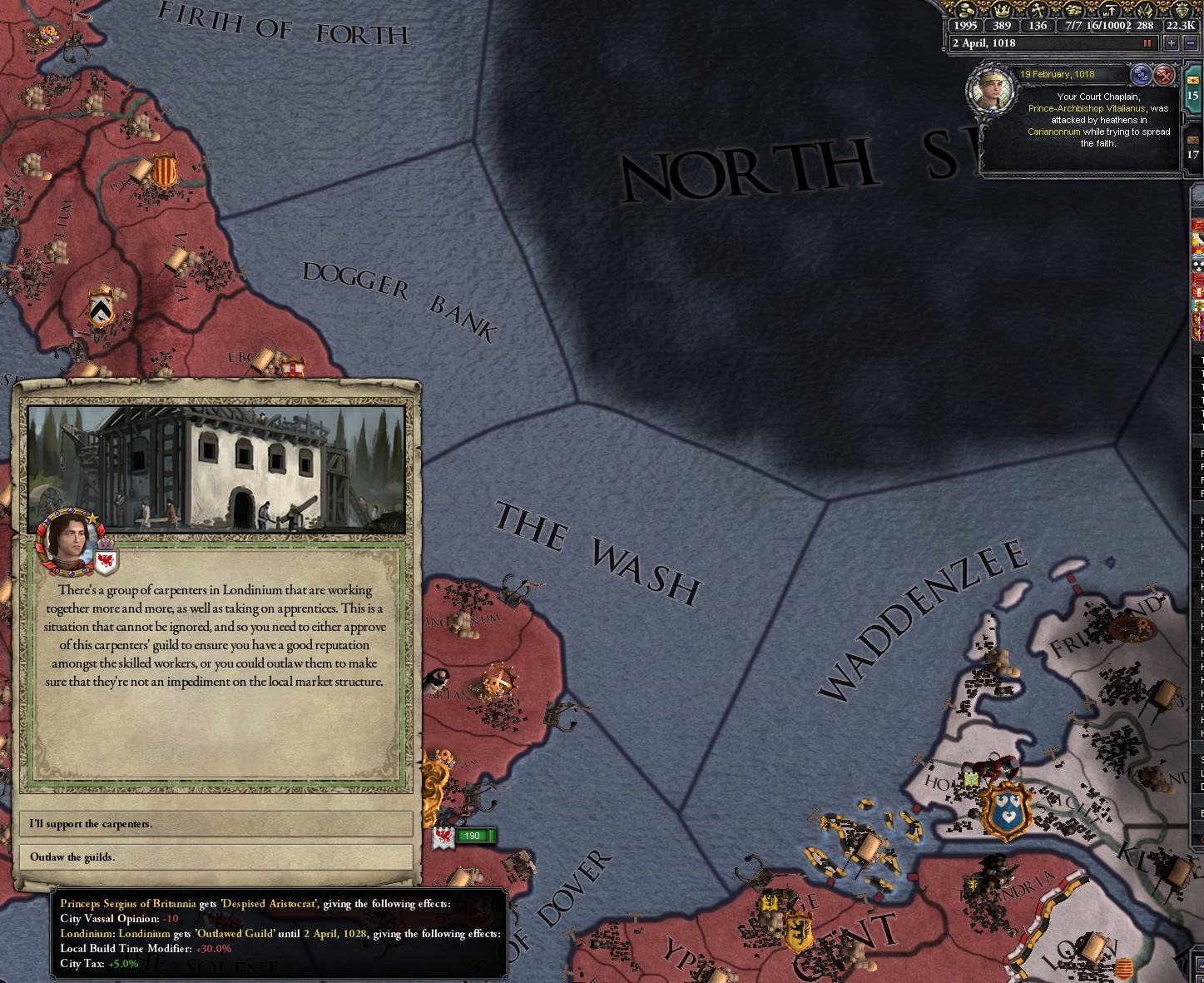
Following Sergius’ election, a group of Anglican carpenters in Londinium from before the Liberation would approach Sergius and ask for him to allow them to rebuild their old Guild. They had already all but rebuilt it, attempting to rebuild a monopoly on construction within Londinium and forcing apprenticeships on new carpenters. The lead master craftsman would lead the delegation of craftsman, arguing that “We have long prospered under the protection of the guild relationship, for it ensures that all who enter the trade are rightly trained! My Consul, do you not agree that one should receive the proper training and skills in their craft before one may practice it? Do you not see what good such practices do? Whats more, the banning of the guilds has caused great disruption in the land, for we helped run the cities! The wealth of the land not of the farm and manor came from the guild! Surely, such disruption and chaos is not what a civilized people would want?”
The master continued on with his speech, imploring Sergius to see the good of the system and to allow its return. However, Sergius would grow tired of the speech as it dragged on several more minutes, and cut the man off and began speaking to the group, “You treat me as king, as if I may make law of my own. The citizens of Rome have spoken. Such...limiting organizations such as yours are forbidden. A man may work where, when, and how he chooses. Such is the basic Freedom of Man by the word of Septimus Severus and accepted by the People of Rome. Now, you are people of Rome, and must abide by her laws. You may work as a corporation, but not by such terms as forcing all who join the field to join you. If you continue to attempt this, your guild will be broken up”
With this re-affirming of the ban, Sergius simply dismissed the gathered craftsmen from the meeting hall in which he took public hearings. He would leave the building and move to a court as it was about to enter session where he would help oversee the proceedings.
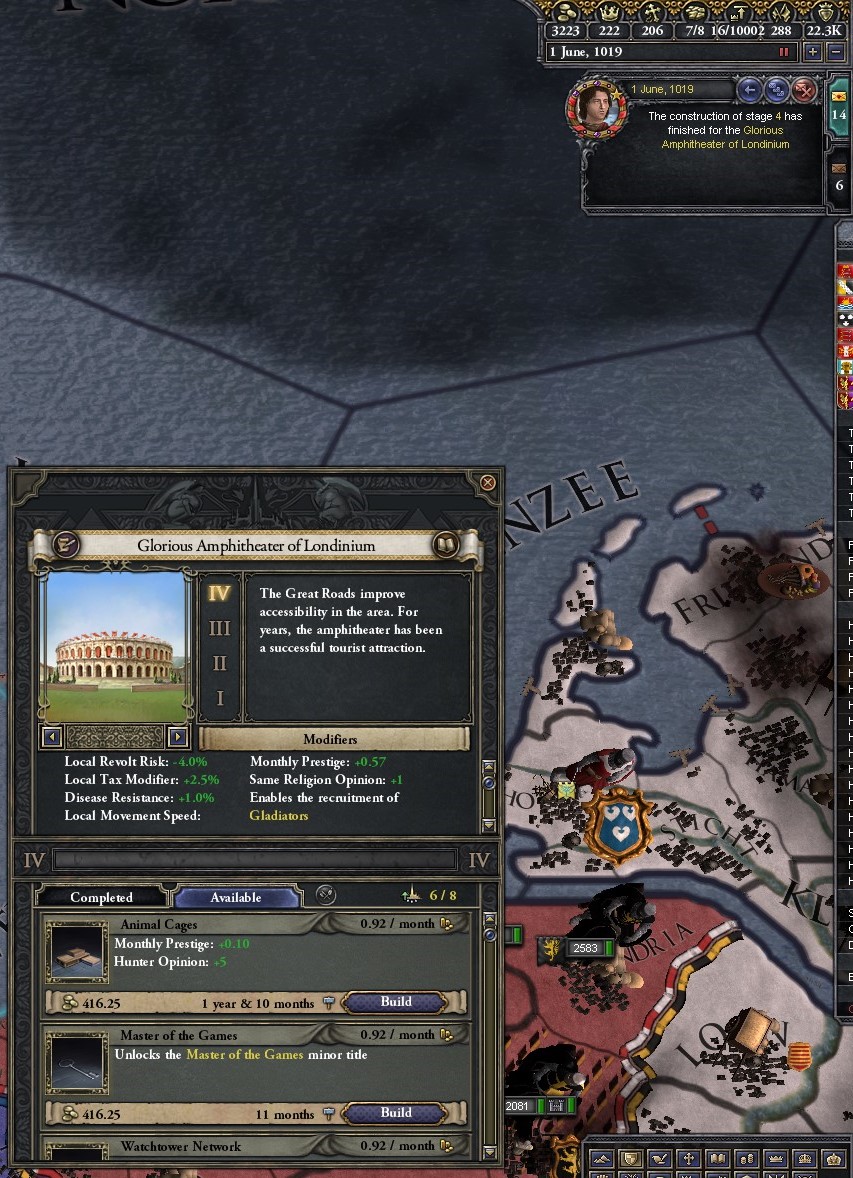
The following year, Sergius would hold a grand ceremony to open the great sports venue that began construction under Consul Leontius twelve years before. With the collapse of the old noble-vassal system, the rise of tournaments had been stifled, but horse racing had risen in its place. These horse racers, many of the old nobility, were invited to the ceremony to show off their skills. Races of all stripes were held, from long distance laps around the track to short dashes of armored warhorses with men dressed for war sitting above. Simultaneously, plays were held in the attached great theater, all as part to appeal to all parts of the populace. But moreover, Sergius used the festivities as a subtle reminder of the new Roman style rule. For while on the first day, much of the activities were quite similar to those of the old English noble games, each day more and more “proper” Roman style events filled the event.
The racers were divided into teams instead of individual glory hunting on the 2nd day, and each team were given the colors of the old chariot races; red, white, green, and blue. The acts in the theater as well began to harken increasingly back to the old Roman period. Eventually, by the 6th and final day of festivities, the races were organized into laps of 5 around the Circus with the regalia of the old chariot races.
The reaction was exactly as Sergius hoped, with the people quickly adopting their favorite team, and the riders themselves taking to the more organized races that allowed both team and individual glory. Beyond this, many of the native Anglo-Saxon people talked positively of the new games and the more Roman style plays. As shown by the aediles and many a populist in Roman history, Sergius thought to himself, Bread and circuses, the quickest way to the population’s heart.
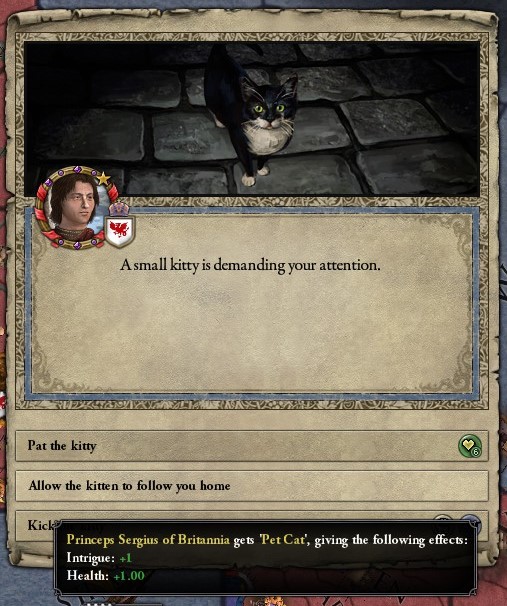
As Sergius made his way back to his domus from the last day of the games, a small kitten poked its head out from an alleyway and looked up at Sergius. It seemed unfrightened, walking right up to him and pawing at a loose part of his boot. He smiled at the reaction and moved to walk away, but the kitten stubbornly followed the Consul. Sergius would continue on his way, but keeping an eye on the kitten, allowing it to follow him home where he would adopt it as a pet.
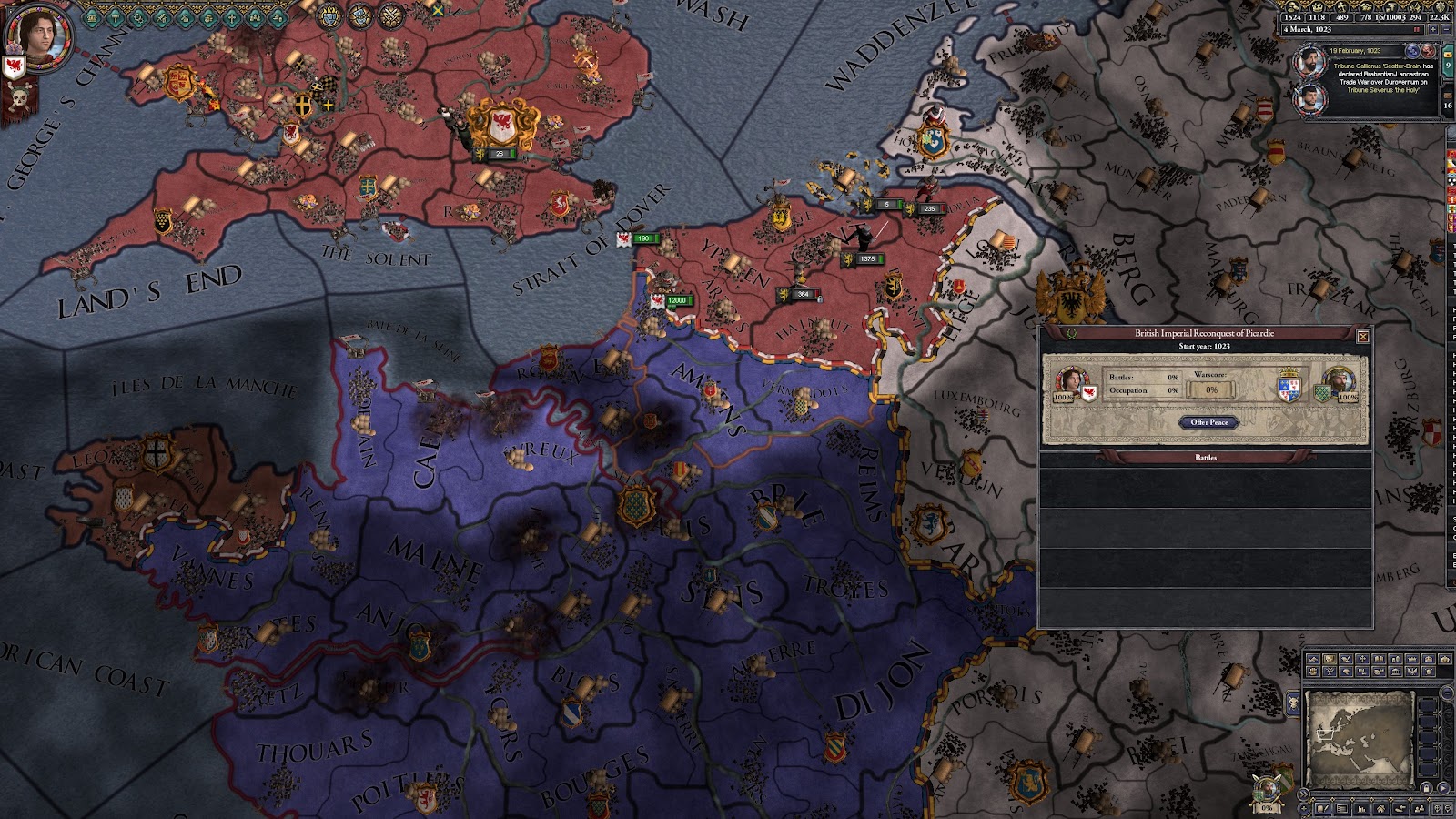
With Roman rule over Brittania all but secured, and feeling that enough time had passed to give the Roman people a break from war, Sergius in 1776 AUC (1023 AD), his 6th year in office, would declare a war to push the border of the European territories of the Empire west to the Sequana (Seine) River. Having transferred his legions to Flanders, he expected a quick decisive war that would put Roman land right up next to Paris, the Capetian French capital. He hoped the threat could make the French monarch do something rash, or better yet, cause a mass civil war and collapse of central authority in French.
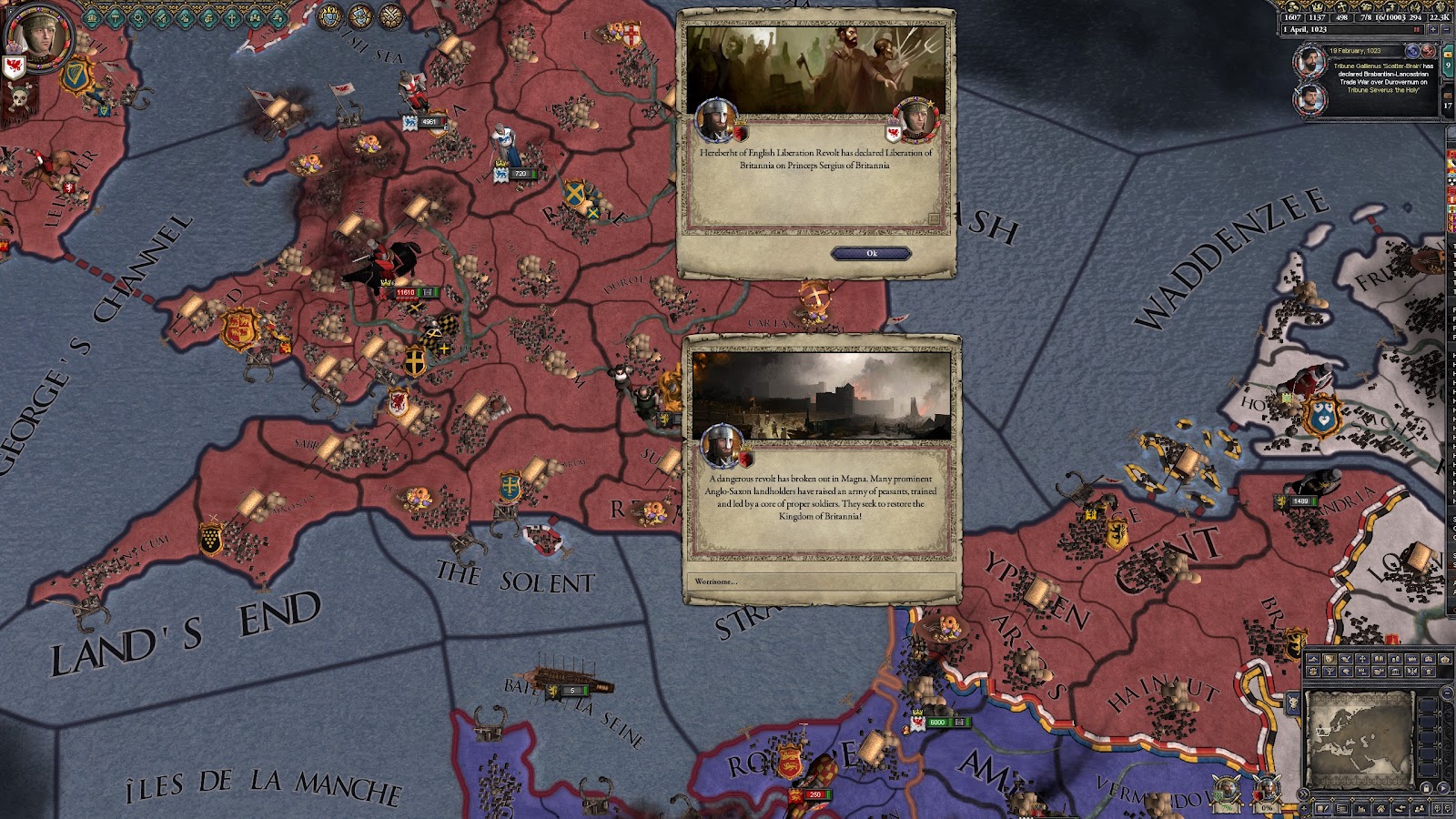
As Sergius lead the II Legio Augusta and the Legion XX Valeria Victrix into Ponthieu, word came in of a massive rebellion sparking north of Glevum. Old English nobility and large land holders who had sat out the previous rebellion saw their chance to make a move with the Legions in France and had raised a large army of mercenaries and desperate peasants who still held loyalty to their old manorial landlords. Faced with the choice of hoping to break the French first or to break the rebellion first and give the French time to organize, Sergius took the latter.
He marched the legions back onto the fleet, and said directly for Glevum.

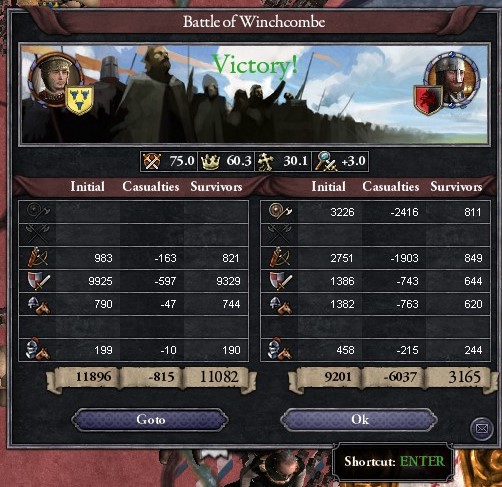
As the fleet approach Glevum, Sergius would receive reports that while the main body of the rebel army was laying siege to the settlement, a smaller army was raiding the countryside for supplies and laying siege to another city. When he was presented with this information, Sergius burst out laughing before declaring, “Our foe is led by fools who think themselves already the victor!” With this in hand, he ordered the Legio XX to depart and land elsewhere to intercept the scattered 2nd enemy army and then march to Glevum to hit the main rebel force from behind.
He and the Legio II Augusta sailed into Glevum at night, receiving a warm welcome from the beleaguered defenders.

The XX was swift in its defeat of the scattered rebel armies, who were smaller and less mobile than the legion. Little mercy was given to those caught, with barely the pretext of trial being given to those even peacefully captured. This third war for England was a final straw, with all hints of rebellion being snuffed out by the sword. After this swift and merciless pacification campaign of the countryside, the XX swung south and marched to Glevum. The rebel army attempted to disengage, but Sergius would sally out from the town, striking them from behind and pinning them down long enough for the XX legion to close the trap. In a mere week, the strongest rebellion yet had been utterly crushed, but Sergius did not wish to delay any longer. Leaving the final pacification and destruction of the rebellious old noble class to the local militias, the legions once again boarded their transport and sailed for France.
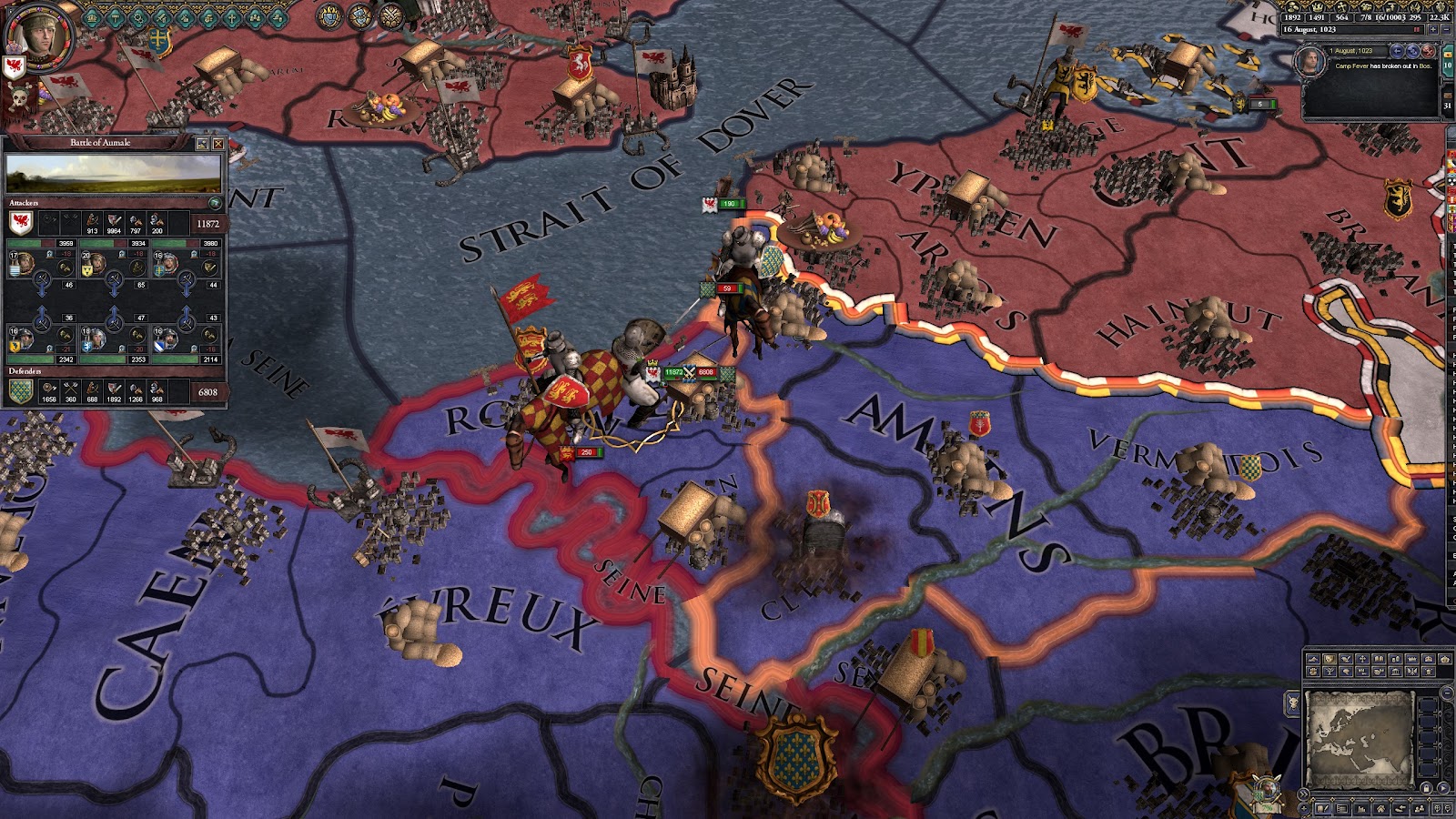

Landing back in Boulogne in late July, Sergius would march quickly back into France. The legions would encounter a French army half their size preparing to board transports. Acting with the by now normal aggressive nature Sergius was becoming known form, the legions overwhelmed the French army. While much of the French cavalry managed to escape, the foot soldiers were overrun utterly, with nearly half the French army killed or captured for a 3rd of that number in casualties in return. It was through those captured at Aumale that Sergius learned that a large French army had moved to land in Icenia (Old Norfolk) and march on Londinium to support the English rebellion in the west.
Sergius was absolutely furious at this news, ordering his troops to revenge the countryside in Picardie in revenge as the Fleet hunted down the French fleet to cut off reinforcements to the army in Britannia. Once he was satisfied, his troops loaded up onto their transports for the seventh time in the year to cross the Channel once more.
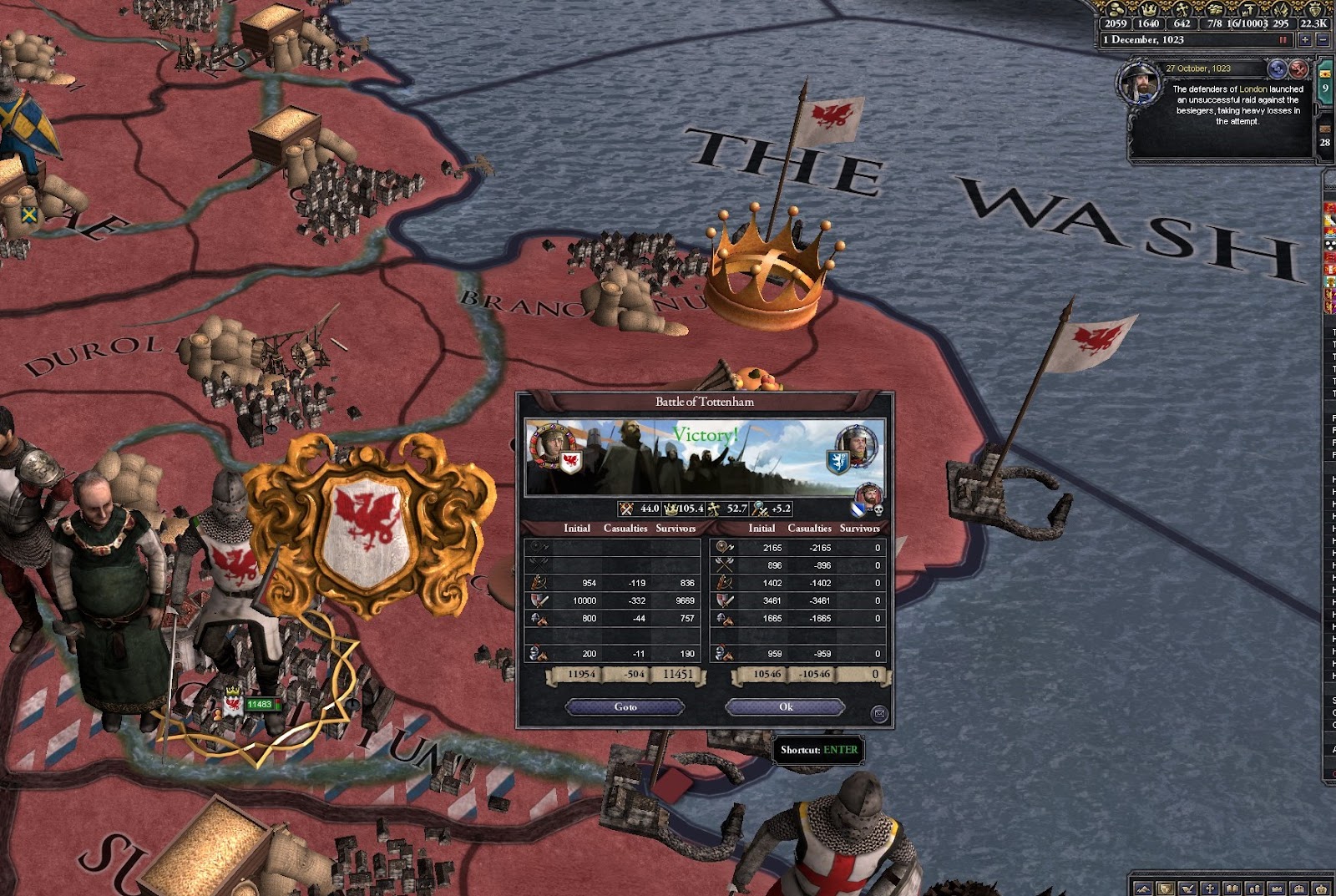
Landing back in Britannia, his soldiers marched on the French army with a ferocity at an enemy of Rome matching that of the armies avenging Caudine Forks against the Sabines at these obstinate enemies who kept making them cross the Channel. Crashing down on the French army that was loaded with spoil and believing any Roman army to be nowhere in sight outside their recent conquest of old Tottenham, the French army was forced to scatter back into their conquered town. The Romans took only as long as was needed to prepare the ladders to assault the walls with a speed completely unexpected. Tottenham became a graveyard, as the French forces were overwhelmed and hacked down, with even the few civilians left in the town cut down alongside them due to the sheer number of French troops.
One of the only notable survivors was Duke Henry of Normandie, with the other two dukes leading the army being cut down alongside their men. As he and his small retinue commandeered a fishing ship and sailed towards France, he remarked “What fools were we to follow the word of the Capet King.”
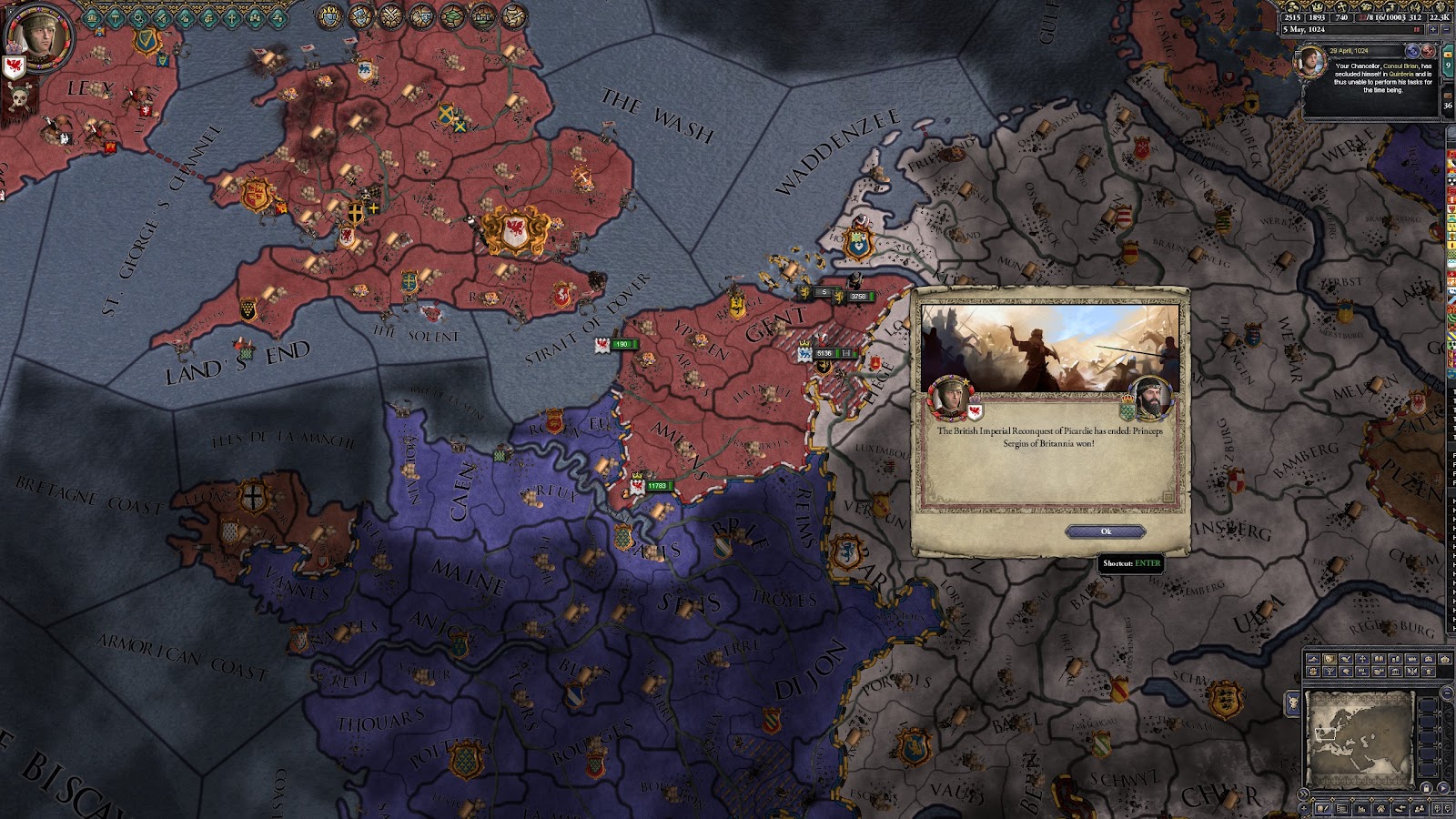
The following year, the Roman legions marched on French once more. Having collected the composure of his army over the course of the winter, Sergius would lead a much more thorough campaign in the spring of 1777 AUC. While the French managed to rally one more army of mercenaries, the outcome was no longer in doubt. With the legions within sight of Paris, the king of France surrendered rather than let the Romans continue to use a refusal to submit as reason to take all of France from him. Picardie was surrendered
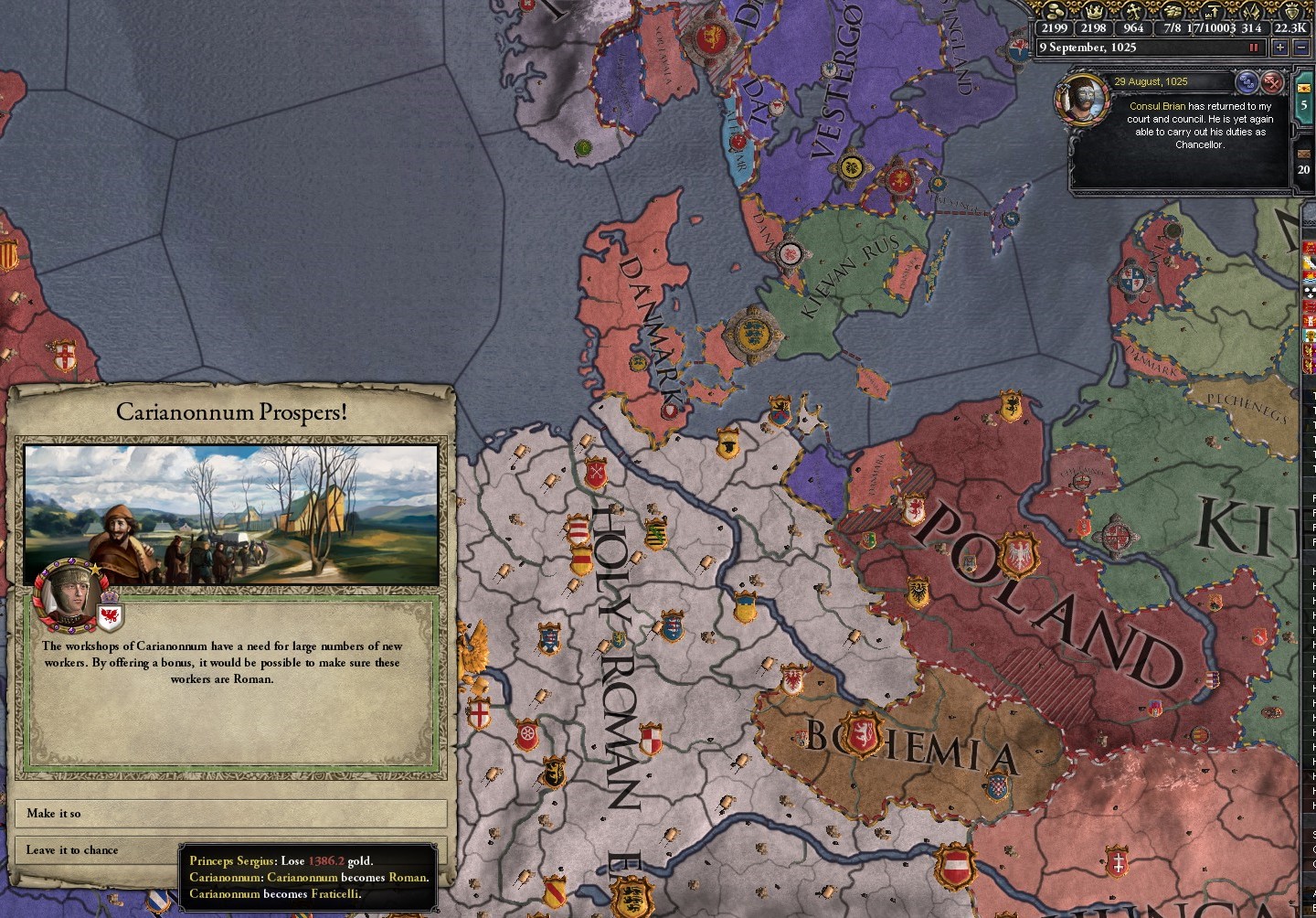
In the years following the war for Picardie, Sergius would push for even stronger Romanization policies. By the end of 1778, Sergius would consider the entire old Saxon Shore territory to have sufficiently adopted the practices of Rome, with the number of citizens now numbering in the low hundreds of thousands across Britannia. To Sergius, his aggressive policy was necessary to bring the light of Rome to the barbarian Anglicans and Saxons that stole the land from Rome. While the rites of Insula insisted original, inherited sin from God was no longer such, Sergius proscribed to these “Germans” the sin of being part of the first death of his great Rome. To those around Sergius, they realized how deeply the war against France and the rebellion had changed him. While Sergius had always been aggressively Roman, he was quite aggressive in his leadership in the legions, but his festivals always focused on the good of uniting the Old English culture with the Roman. Now, such niceties were gone from his demeanor, with all that remained was a deep disdain for those who in his mind stood against Rome’s apparent destiny to reclaim its empire, real or not.

Whilst Sergius focused on his perceived internal enemies to the concern of the Senate, France would begin to fall into the exact chaos that Sergius had hoped. Duke Henry de Normandie had taken the opportunity presented by the massive loss against the Romans to claim the French throne. In a two year civil war, he emerged victorious and began attempting to bring centralized rule to the uppity nobility of France. Sergius would go to the Senate and demand a second war with France, attacking those unwilling to go to war so soon as cowards who failed to see the time was right. He wished to take Normandy from the Franks, which would in turn de-legitimize the already shaky hold the new King Henry de Normandie held on France. Eventually, his arguments won over the Senate, as the chance to shatter a strong enemy like had been done to England was too enticing an idea. Immediately Sergius would take the XX legion in Londinium across the straight and reinforce the II legion, then they moved on Normandy.


Crossing the Seine, the combined legions would meet a surprisingly large French army outside Argentan. Sergius saw no reason for attempting to deploy any unusual tactics, as he noticed much of the French army were under armed conscripted peasants. Without even bothering with skirmishing attempts to crowd or contain the enemy, Sergius relied on his heavy infantry to cut a bloody swath through the French forces with the cavalry simply protecting the wings.
The unimaginative tactics proved costly however, as the massive French archer wing simply overwhelmed the Roman with heavy casualties. The large contingent of heavy infantry, a mix of men-at-arms and dismounted knights also proved a resilient combination even as the peasants around them fell like flies. By the end of the battle, the toll on both sides was clear. While the French lost the field and had suffered twice the number of casualties, nearly a quarter of the Roman army was dead or injured. Sergius was not deterred despite this, as instead he simply repeated what he had always done after he held the field after an enemy annoyed him; ordering merciless raids on the surrounding countryside.
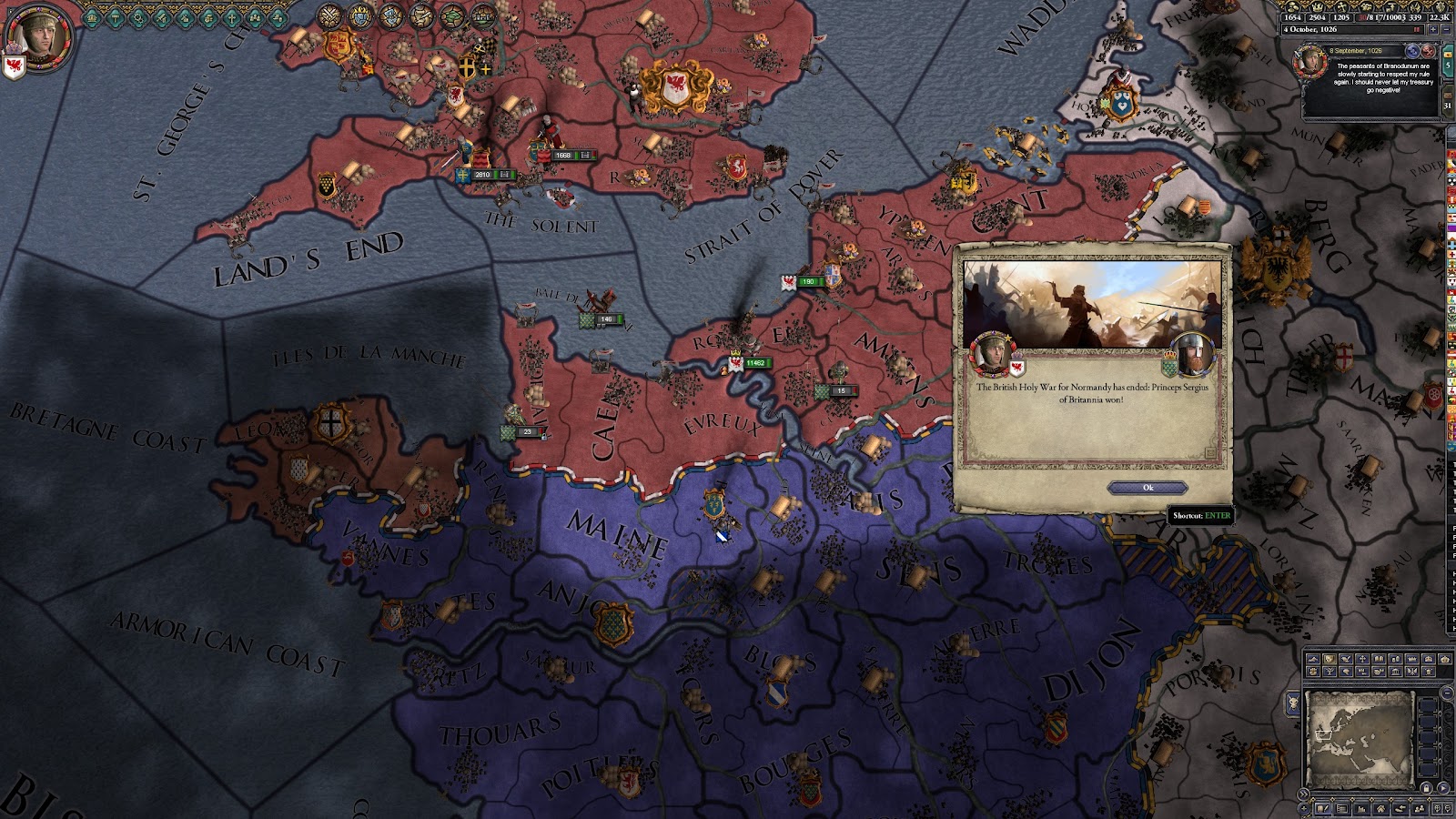
Faced with mass desertion and seeing the writing on the wall, Henry surrendered his family’s long held land to the Romans. But he knew this was just the beginning, both in the fight with the Romans, and to keep his hard fought throne. Sergius meanwhile set sail back to Londinium, bringing to the city the plunder earned from the raiding of France. As he stood in the new forum, he would announce, “I, Sergius Salvius, stand before you, the People and Citizens of Rome to announce my candidacy for the coming election of 1780. I have brought the Channel under our dominion, the Frankish barbarian kings lay vanquished and in ruin before our arms. I promise, Rome will continue its rightful path under my leadership. Glory be to God, Glory be to Rome, and Woe to those who stand before Her!”

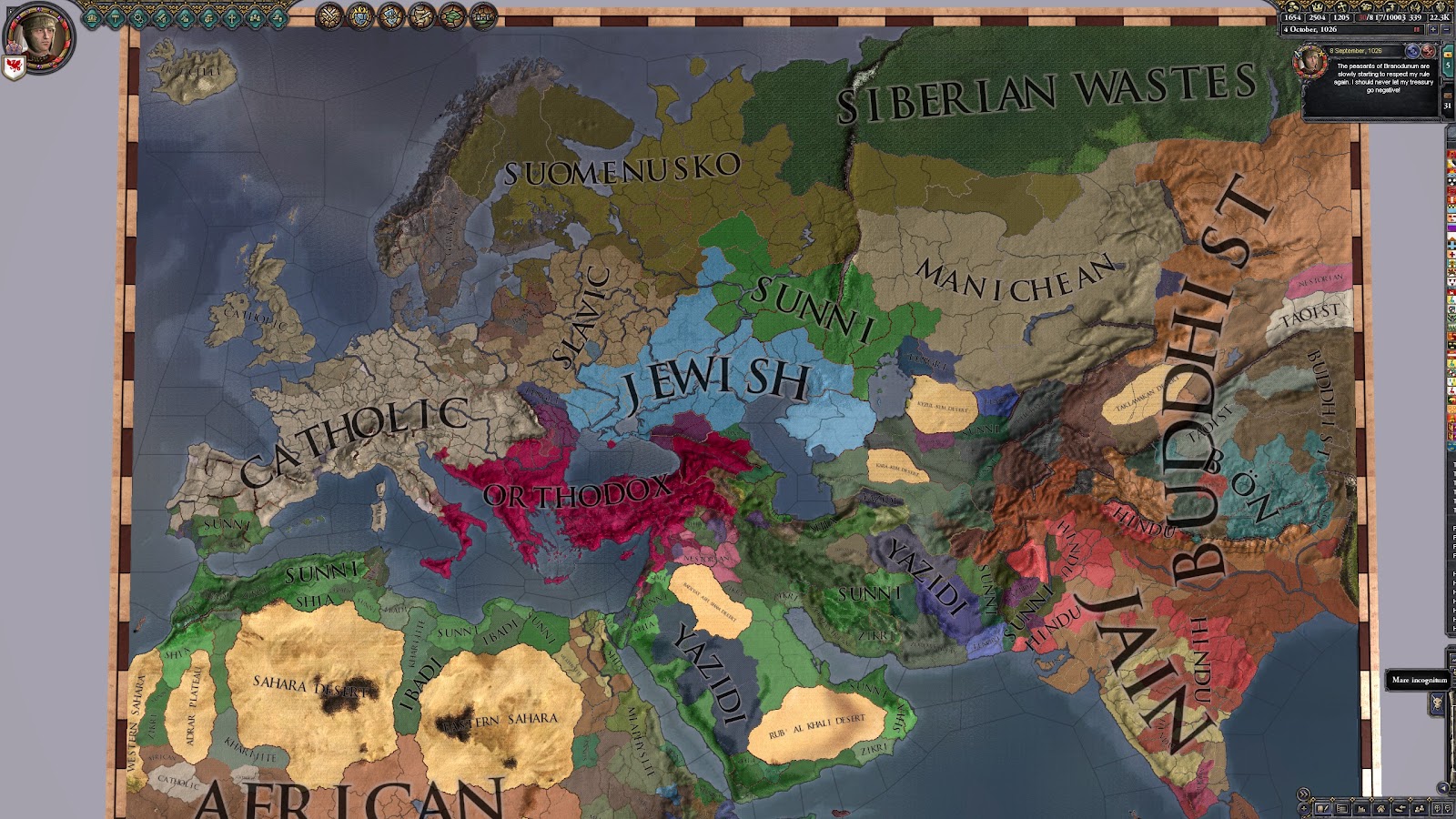
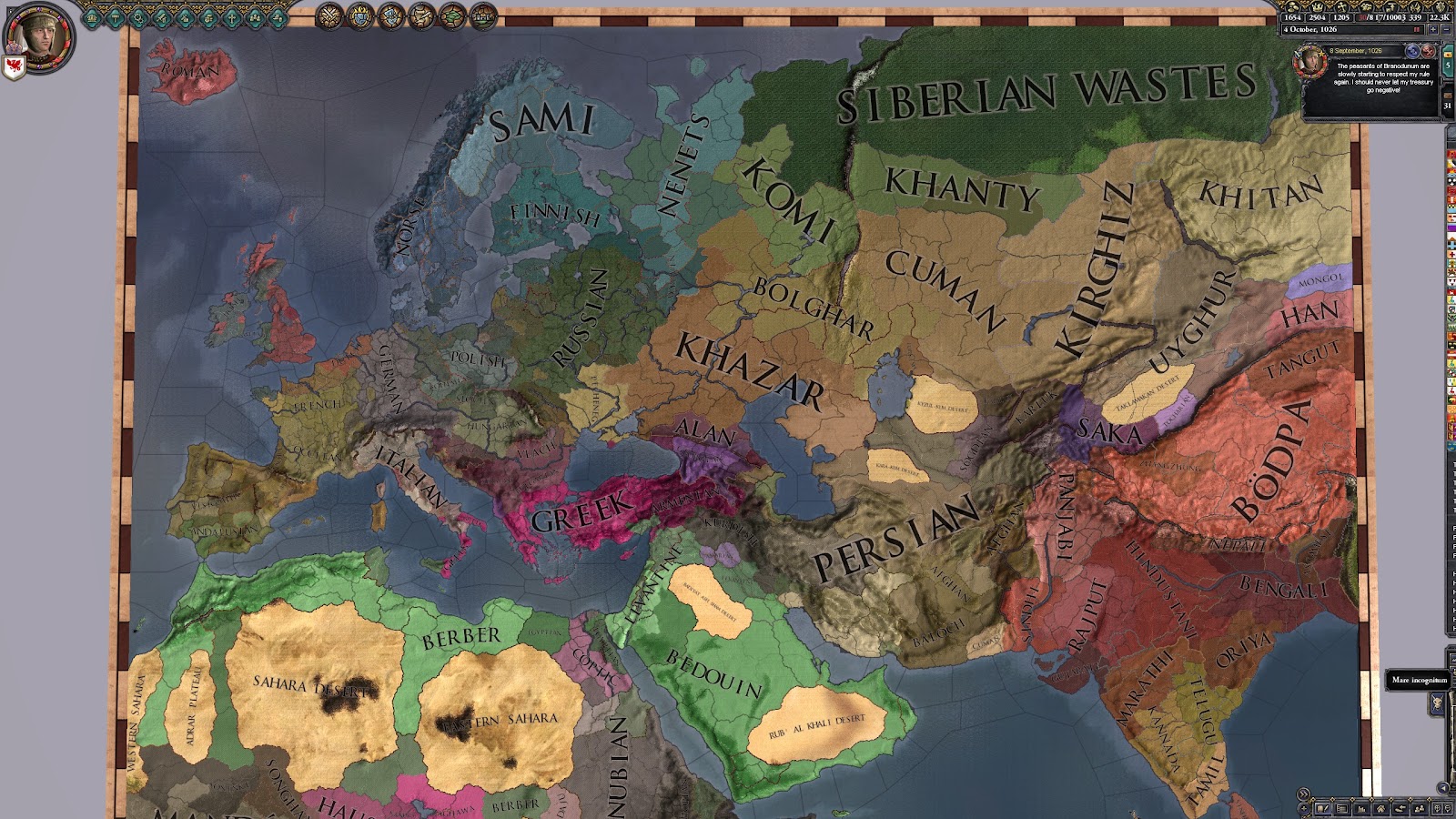

Situation of the World, 4 October, 1026 AD / 1779 AUC
"I am a simple man, really. I tire of my cousins obsession with this worthless land to the west. Rome and her destiny lay in reclaiming what is rightfully her's, and bringing her laws, her language, and her light back to all the land she once claimed as hers." - Sergius Salvius, to a friend on what his opinion is on the establishment of the Vinum explorations.
Following Sergius’ election, a group of Anglican carpenters in Londinium from before the Liberation would approach Sergius and ask for him to allow them to rebuild their old Guild. They had already all but rebuilt it, attempting to rebuild a monopoly on construction within Londinium and forcing apprenticeships on new carpenters. The lead master craftsman would lead the delegation of craftsman, arguing that “We have long prospered under the protection of the guild relationship, for it ensures that all who enter the trade are rightly trained! My Consul, do you not agree that one should receive the proper training and skills in their craft before one may practice it? Do you not see what good such practices do? Whats more, the banning of the guilds has caused great disruption in the land, for we helped run the cities! The wealth of the land not of the farm and manor came from the guild! Surely, such disruption and chaos is not what a civilized people would want?”
The master continued on with his speech, imploring Sergius to see the good of the system and to allow its return. However, Sergius would grow tired of the speech as it dragged on several more minutes, and cut the man off and began speaking to the group, “You treat me as king, as if I may make law of my own. The citizens of Rome have spoken. Such...limiting organizations such as yours are forbidden. A man may work where, when, and how he chooses. Such is the basic Freedom of Man by the word of Septimus Severus and accepted by the People of Rome. Now, you are people of Rome, and must abide by her laws. You may work as a corporation, but not by such terms as forcing all who join the field to join you. If you continue to attempt this, your guild will be broken up”
With this re-affirming of the ban, Sergius simply dismissed the gathered craftsmen from the meeting hall in which he took public hearings. He would leave the building and move to a court as it was about to enter session where he would help oversee the proceedings.
The following year, Sergius would hold a grand ceremony to open the great sports venue that began construction under Consul Leontius twelve years before. With the collapse of the old noble-vassal system, the rise of tournaments had been stifled, but horse racing had risen in its place. These horse racers, many of the old nobility, were invited to the ceremony to show off their skills. Races of all stripes were held, from long distance laps around the track to short dashes of armored warhorses with men dressed for war sitting above. Simultaneously, plays were held in the attached great theater, all as part to appeal to all parts of the populace. But moreover, Sergius used the festivities as a subtle reminder of the new Roman style rule. For while on the first day, much of the activities were quite similar to those of the old English noble games, each day more and more “proper” Roman style events filled the event.
The racers were divided into teams instead of individual glory hunting on the 2nd day, and each team were given the colors of the old chariot races; red, white, green, and blue. The acts in the theater as well began to harken increasingly back to the old Roman period. Eventually, by the 6th and final day of festivities, the races were organized into laps of 5 around the Circus with the regalia of the old chariot races.
The reaction was exactly as Sergius hoped, with the people quickly adopting their favorite team, and the riders themselves taking to the more organized races that allowed both team and individual glory. Beyond this, many of the native Anglo-Saxon people talked positively of the new games and the more Roman style plays. As shown by the aediles and many a populist in Roman history, Sergius thought to himself, Bread and circuses, the quickest way to the population’s heart.
As Sergius made his way back to his domus from the last day of the games, a small kitten poked its head out from an alleyway and looked up at Sergius. It seemed unfrightened, walking right up to him and pawing at a loose part of his boot. He smiled at the reaction and moved to walk away, but the kitten stubbornly followed the Consul. Sergius would continue on his way, but keeping an eye on the kitten, allowing it to follow him home where he would adopt it as a pet.
With Roman rule over Brittania all but secured, and feeling that enough time had passed to give the Roman people a break from war, Sergius in 1776 AUC (1023 AD), his 6th year in office, would declare a war to push the border of the European territories of the Empire west to the Sequana (Seine) River. Having transferred his legions to Flanders, he expected a quick decisive war that would put Roman land right up next to Paris, the Capetian French capital. He hoped the threat could make the French monarch do something rash, or better yet, cause a mass civil war and collapse of central authority in French.
As Sergius lead the II Legio Augusta and the Legion XX Valeria Victrix into Ponthieu, word came in of a massive rebellion sparking north of Glevum. Old English nobility and large land holders who had sat out the previous rebellion saw their chance to make a move with the Legions in France and had raised a large army of mercenaries and desperate peasants who still held loyalty to their old manorial landlords. Faced with the choice of hoping to break the French first or to break the rebellion first and give the French time to organize, Sergius took the latter.
He marched the legions back onto the fleet, and said directly for Glevum.
As the fleet approach Glevum, Sergius would receive reports that while the main body of the rebel army was laying siege to the settlement, a smaller army was raiding the countryside for supplies and laying siege to another city. When he was presented with this information, Sergius burst out laughing before declaring, “Our foe is led by fools who think themselves already the victor!” With this in hand, he ordered the Legio XX to depart and land elsewhere to intercept the scattered 2nd enemy army and then march to Glevum to hit the main rebel force from behind.
He and the Legio II Augusta sailed into Glevum at night, receiving a warm welcome from the beleaguered defenders.
The XX was swift in its defeat of the scattered rebel armies, who were smaller and less mobile than the legion. Little mercy was given to those caught, with barely the pretext of trial being given to those even peacefully captured. This third war for England was a final straw, with all hints of rebellion being snuffed out by the sword. After this swift and merciless pacification campaign of the countryside, the XX swung south and marched to Glevum. The rebel army attempted to disengage, but Sergius would sally out from the town, striking them from behind and pinning them down long enough for the XX legion to close the trap. In a mere week, the strongest rebellion yet had been utterly crushed, but Sergius did not wish to delay any longer. Leaving the final pacification and destruction of the rebellious old noble class to the local militias, the legions once again boarded their transport and sailed for France.
Landing back in Boulogne in late July, Sergius would march quickly back into France. The legions would encounter a French army half their size preparing to board transports. Acting with the by now normal aggressive nature Sergius was becoming known form, the legions overwhelmed the French army. While much of the French cavalry managed to escape, the foot soldiers were overrun utterly, with nearly half the French army killed or captured for a 3rd of that number in casualties in return. It was through those captured at Aumale that Sergius learned that a large French army had moved to land in Icenia (Old Norfolk) and march on Londinium to support the English rebellion in the west.
Sergius was absolutely furious at this news, ordering his troops to revenge the countryside in Picardie in revenge as the Fleet hunted down the French fleet to cut off reinforcements to the army in Britannia. Once he was satisfied, his troops loaded up onto their transports for the seventh time in the year to cross the Channel once more.
Landing back in Britannia, his soldiers marched on the French army with a ferocity at an enemy of Rome matching that of the armies avenging Caudine Forks against the Sabines at these obstinate enemies who kept making them cross the Channel. Crashing down on the French army that was loaded with spoil and believing any Roman army to be nowhere in sight outside their recent conquest of old Tottenham, the French army was forced to scatter back into their conquered town. The Romans took only as long as was needed to prepare the ladders to assault the walls with a speed completely unexpected. Tottenham became a graveyard, as the French forces were overwhelmed and hacked down, with even the few civilians left in the town cut down alongside them due to the sheer number of French troops.
One of the only notable survivors was Duke Henry of Normandie, with the other two dukes leading the army being cut down alongside their men. As he and his small retinue commandeered a fishing ship and sailed towards France, he remarked “What fools were we to follow the word of the Capet King.”
The following year, the Roman legions marched on French once more. Having collected the composure of his army over the course of the winter, Sergius would lead a much more thorough campaign in the spring of 1777 AUC. While the French managed to rally one more army of mercenaries, the outcome was no longer in doubt. With the legions within sight of Paris, the king of France surrendered rather than let the Romans continue to use a refusal to submit as reason to take all of France from him. Picardie was surrendered
In the years following the war for Picardie, Sergius would push for even stronger Romanization policies. By the end of 1778, Sergius would consider the entire old Saxon Shore territory to have sufficiently adopted the practices of Rome, with the number of citizens now numbering in the low hundreds of thousands across Britannia. To Sergius, his aggressive policy was necessary to bring the light of Rome to the barbarian Anglicans and Saxons that stole the land from Rome. While the rites of Insula insisted original, inherited sin from God was no longer such, Sergius proscribed to these “Germans” the sin of being part of the first death of his great Rome. To those around Sergius, they realized how deeply the war against France and the rebellion had changed him. While Sergius had always been aggressively Roman, he was quite aggressive in his leadership in the legions, but his festivals always focused on the good of uniting the Old English culture with the Roman. Now, such niceties were gone from his demeanor, with all that remained was a deep disdain for those who in his mind stood against Rome’s apparent destiny to reclaim its empire, real or not.
Whilst Sergius focused on his perceived internal enemies to the concern of the Senate, France would begin to fall into the exact chaos that Sergius had hoped. Duke Henry de Normandie had taken the opportunity presented by the massive loss against the Romans to claim the French throne. In a two year civil war, he emerged victorious and began attempting to bring centralized rule to the uppity nobility of France. Sergius would go to the Senate and demand a second war with France, attacking those unwilling to go to war so soon as cowards who failed to see the time was right. He wished to take Normandy from the Franks, which would in turn de-legitimize the already shaky hold the new King Henry de Normandie held on France. Eventually, his arguments won over the Senate, as the chance to shatter a strong enemy like had been done to England was too enticing an idea. Immediately Sergius would take the XX legion in Londinium across the straight and reinforce the II legion, then they moved on Normandy.
Crossing the Seine, the combined legions would meet a surprisingly large French army outside Argentan. Sergius saw no reason for attempting to deploy any unusual tactics, as he noticed much of the French army were under armed conscripted peasants. Without even bothering with skirmishing attempts to crowd or contain the enemy, Sergius relied on his heavy infantry to cut a bloody swath through the French forces with the cavalry simply protecting the wings.
The unimaginative tactics proved costly however, as the massive French archer wing simply overwhelmed the Roman with heavy casualties. The large contingent of heavy infantry, a mix of men-at-arms and dismounted knights also proved a resilient combination even as the peasants around them fell like flies. By the end of the battle, the toll on both sides was clear. While the French lost the field and had suffered twice the number of casualties, nearly a quarter of the Roman army was dead or injured. Sergius was not deterred despite this, as instead he simply repeated what he had always done after he held the field after an enemy annoyed him; ordering merciless raids on the surrounding countryside.
Faced with mass desertion and seeing the writing on the wall, Henry surrendered his family’s long held land to the Romans. But he knew this was just the beginning, both in the fight with the Romans, and to keep his hard fought throne. Sergius meanwhile set sail back to Londinium, bringing to the city the plunder earned from the raiding of France. As he stood in the new forum, he would announce, “I, Sergius Salvius, stand before you, the People and Citizens of Rome to announce my candidacy for the coming election of 1780. I have brought the Channel under our dominion, the Frankish barbarian kings lay vanquished and in ruin before our arms. I promise, Rome will continue its rightful path under my leadership. Glory be to God, Glory be to Rome, and Woe to those who stand before Her!”
Situation of the World, 4 October, 1026 AD / 1779 AUC
- 2
- 1
Wonder if your gonna take up the old roman tradition of setting up puppet states to bring in tribute, allys, and divide up the "barbarians" of continental Europe
- 1
I plan on it. Even have a mod specifically installed for that. When and where they shall be? Well, we shall see.Wonder if your gonna take up the old roman tradition of setting up puppet states to bring in tribute, allys, and divide up the "barbarians" of continental Europe
- 1
By the time Rome is retaken, I suspect the Romans will feel more at home in Britannia.
- 2
- 1
It seems as if Rome is once more expanding.
It would be ironic if Germania was one of the first lands conquered by this new Rome.
"While the rites of Insula insisted original, inherited sin from God was no longer such, Sergius proscribed to these “Germans” the sin of being part of the first death of his great Rome" - I thought the entire point of original sin being nonexistent was that sin wasn't inherited? This feels hypocritical.
It would be ironic if Germania was one of the first lands conquered by this new Rome.
"While the rites of Insula insisted original, inherited sin from God was no longer such, Sergius proscribed to these “Germans” the sin of being part of the first death of his great Rome" - I thought the entire point of original sin being nonexistent was that sin wasn't inherited? This feels hypocritical.
- 1
This read to me like he's not saying each individual German has inherited it from the ones back then who were involved directly but rather that the German civilization is still the same one that is responsible even though no individual person from back then is still alive.It seems as if Rome is once more expanding.
It would be ironic if Germania was one of the first lands conquered by this new Rome.
"While the rites of Insula insisted original, inherited sin from God was no longer such, Sergius proscribed to these “Germans” the sin of being part of the first death of his great Rome" - I thought the entire point of original sin being nonexistent was that sin wasn't inherited? This feels hypocritical.
But I'm not religious anymore so may be misreading.
- 1
I find it quite funny that among all the comments, the realisation that these radicalised Romans aren't exactly the "Good Guys" is dawning.
This feels appropriate.

Also fantastic work as per usual! Eagerly following the continuation of this!
This feels appropriate.

Also fantastic work as per usual! Eagerly following the continuation of this!
- 1
- 1
To be fair, most any society in these times can be viewed as horrifically barbarous and backward (And hypocritical coughcoughCrusadescoughcough) by today's standards. Trying to apply modern standards of good and evil to a society like this that prides itself on standards remarkably different than our own is pretty unfair.I find it quite funny that among all the comments, the realisation that these radicalised Romans aren't exactly the "Good Guys" is dawning.
This feels appropriate.

Also fantastic work as per usual! Eagerly following the continuation of this!
These neo-Romans due to their isolation and history of constant warfare believe that anything that is both Roman and (their specific creed of) Christian is good, and the native populations of the regions they've reconquered are idolatrous barbarian usurpers who murdered their countrymen, corrupted their religion, and stole their land for themselves. It makes sense that after losing everything to these peoples they would have a lasting hatred and resentment to their society and culture. Sort of like OTL's Balkans, really; they justify this oppressive and warmongering behavior with the fact that, in their minds at least, the 'barbarians' were the ones that started it, and they were only repaying them in an equal manner as any good Roman should, even if that fashion of repaying is horrific to an outsider.
I think Tiberonius has done a good job building a somewhat realistic setting and culture that subscribes to that ideology, and perhaps there will be circumstances later on that help to further deconstruct that ideology.
Last edited:
- 3
- 1
Glad to hear I was able to get that general feeling across. And if the game gives me the oppurtunity, I'll almost certainly further deconstruct that two faced nature and ultranationalist nature of these Romans.To be fair, most any society in these times can be viewed as horrifically barbarous and backward (And hypocritical coughcoughCrusadescoughcough) by today's standards. Trying to apply modern standards of good and evil to a society like this that prides itself on standards remarkably different than our own is pretty unfair.
These neo-Romans due to their isolation and history of constant warfare believe that anything that is both Roman and (their specific creed of) Christian is good, and the native populations of the regions they've reconquered are idolatrous barbarian usurpers who murdered their countrymen, corrupted their religion, and stole their land for themselves. It makes sense that after losing everything to these peoples they would have a lasting hatred and resentment to their society and culture. Sort of like OTL's Balkans, really; they justify this oppressive and warmongering behavior with the fact that, in their minds at least, the 'barbarians' were the ones that started it, and they were only repaying them in an equal manner as any good Roman should, even if that fashion of repaying is horrific to an outsider.
I think Tiberonius has done a good job building a somewhat realistic setting and culture that subscribes to that ideology, and perhaps there will be circumstances later on that help to further deconstruct that ideology.One can hope for the sake of the poor Germanians and Norsemen they're slaughtering anyway.
- 1
I for one do not find our modern "enlightened" times any more moral than the so called hypocritical Medievals. The "enlightened" are quick to call opponents racists, sexists, homophobes and xenophobes if they do not follow their worldview. Probably the best place to start is by being nicer to those that you personally know and let outsiders take care of themselves. Everyone please be careful while searching for happiness.
- 3
- 1
- 1
I really apologize for suddenly vanishing from the face of the Earth and not updating this AAR in so long. I started my first semester of teaching in January and it absolutely consumed all available time and energy I had. I have backup projects (Stellaris based) in mind, but before I consider this AAR fully dead and move on, I want to get a feel for if there is anyone interested in this AAR being continued. Whatever I do, thenext post be it a new AAR or the continuation could reasonably be expected a few days after the decision, and expect weekly or twice-a-week updates for at least the next 2 months.
https://strawpoll.com/zyxvz36o4 please answer on this poll as to what I should do
Thank you for your help and patience!
-Tiber
https://strawpoll.com/zyxvz36o4 please answer on this poll as to what I should do
Thank you for your help and patience!
-Tiber
Last edited:
- 3
- 1

